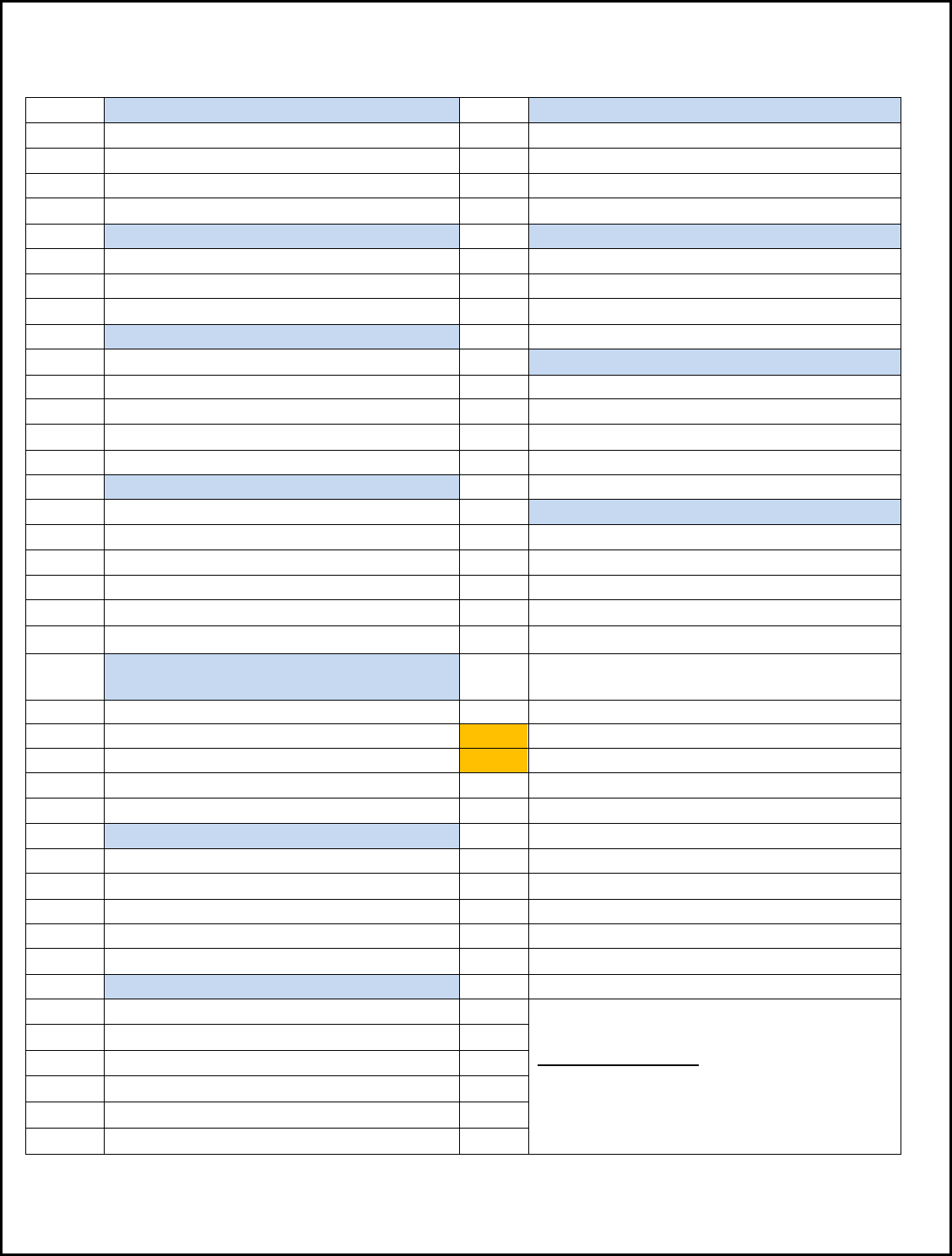
Clay County Schools System Calendar 2020-2021
JULY 2020
FEBRUARY 2021
20-21
New Teacher/Personnel Orientation
8
Progress Reports 3
rd
9 Weeks
22-31
Preplanning
12-15
Mid-Winter Break (Schools Closed) **
30
Open House
19
End of 6
th
Month
AUGUST 2020
MARCH 2021
3
Students First Day
5
FTE Count #3
27
½ PL Day (Early Release) *
12
End of 3
rd
9 Weeks (46)
28
End of 1
st
Month
18
Report Cards/½ Day Students & P/T Conf.
SEPTEMBER 2020
19
End of 7
th
Month
2
Progress Reports 1
st
9 Weeks
APRIL 2021
7
Labor Day (Schools Closed)
2
½ PL Day (Early Release)*
17
½ Day PL (Early Release) *
5-9
Spring Break
28
End of 2
nd
Month
21
Progress Reports 4
th
9 Weeks
23
End of 8
th
Month
OCTOBER 2020
2
End of 1
st
9 Weeks (44 days)
MAY 2021
6
FTE Count #1
17
Awards Day CCES & CCMS
7
Report Cards
17
8
th
Grade Celebration @12:30 pm
7
½ Day for Students & Parent/Teacher Conf.
18
PK Program @ 10:30 am
12-16
Fall Break (Schools Closed)
19
Kindergarten Graduation @ 10:00 am
20
Field Day/Intramural Games
NOVEMBER 2020
21
End of 4
th
9 Weeks (45 Days)/End of 2
nd
Semester (91 Days)
2
End of 3
rd
Month
21
Students Last Day (Early Release) *
11
Progress Reports 2
nd
9 Weeks
21
Graduation for Quitman Co. HS
20
½ Day PL (Early Release) *
21
Graduation for Randolph-Clay HS
23-27
Thanksgiving Holidays (Schools Closed)
24-25
Post Planning
25
Report Cards
DECEMBER 2020
7
End of 4
th
Month
18
End of 2
nd
9 Weeks (45 days)/1
st
Sem. (89)
18
½ PL Day (Early Release) *
21-31
Winter Break (Schools Closed)
Student Days = 180
Teacher Days = 190
JANUARY 2021
1
Winter Break (Schools Closed)
*Denotes ½ Day Early Release
**Potential Make-up Day(s)
STATE ASSESSMENTS
EOG for Clay County (April 19-29, 2021)
4
Teachers Return from Winter Break PL Day
5
Students Return from Winter Break
13
Report Cards
18
MLK Holiday (Schools Closed)
20
End of 5
th
Month

2
Message from the Principal
Greetings,
Welcome to Clay County Elementary School. We are proud of our dedicated, experienced staff and our enthusiastic
learners.
As demands and complexities of teaching children increase, it becomes more evident that we all need to work
together to ensure that our children reach their potential. We believe that all of us, the school and community, must
work together in an extended family environment to insure success for all students.
It is our desire to keep you informed of all that is taking place with our school. Updates and additional information
will be sent to you through our school webpage, email, phone calls and our social media pages. If you have any
questions or concerns at any time, please do not hesitate to give your child’s teacher or me a call. I look forward to
having a long and rewarding relationship with you and your family.
I believe with everyone’s commitment for student success, including strong support and participation by the parents,
we can achieve our vision to inspire every student to become college and career ready.
Sincerely,
Kimberly Johnson
Kimberly Johnson
Principal
Beliefs
We believe that…
• All children can learn in a safe and orderly environment.
• In order to be successful in school, our children need support from both the home and school.
• Risk-taking and innovation are the foundations of student and staff engagement.
• Students and teachers are more than test scores and each person has something to contribute to the school.
• Learning is a shared responsibility among all students, teachers, staff, parents, and community members.
School Motto
Who Am I?
Our deepest fear is not that we are inadequate.
Our deepest fear is that we are powerful beyond measure.
It is our light, not our darkness, that most frightens us.
We ask ourselves, who am I to be brilliant, gorgeous, talented, and fabulous?
Actually, who are you not to be?
You are a child with immeasurable opportunities.
You’re playing small doesn’t serve the world.
There’s nothing enlightening about shrinking so that other people won’t feel insecure around you.
We were born to make use of the strength that is within us.
It’s not just in some of us; it’s in everyone.
And as we let our light shine,
we unconsciously give other people permission to do the same.
As we are liberated from our own fear,
our presence automatically liberates others.
Nelson Mandela’s 1994 Inaugural Speech (altered)

3
CONTACT INFORMATION:
SCHOOL CONTACT INFORMATION
200 Hobbs Lane
Fort Gaines, GA 39851
Phone: 229-768-2234
Fax: 229-768-2363
Clay County Board of Education: ....................................................................................................... 229-768-2232
CHANGE OF ADDRESS OR PHONE NUMBER
Please notify the school immediately if your address or phone number changes. Our office must be able to contact
you in the event
your child has an accident, becomes ill at school, school is dismissed early, or for other reasons.
Office Hours: 7:00 AM to 4:00 PM
The regular school day for elementary school children is from 8:00 AM to 3:30 PM.
C
C
L
L
A
A
Y
Y
C
C
O
O
U
U
N
N
T
T
Y
Y
B
B
O
O
A
A
R
R
D
D
O
O
F
F
E
E
D
D
U
U
C
C
A
A
T
T
I
I
O
O
N
N
Mr. Corderal Gilbert – Chairman
Mr. Dwylan Glover, Sr- Vice Chairman
Mr. Samuel Thornton
Dr. Karen Kinsell
Ms. Genetta Moore
S
S
U
U
P
P
E
E
R
R
I
I
N
N
T
T
E
E
N
N
D
D
E
E
N
N
T
T
Mr. John Hamilton
ASSOCIATE SUPERINTENDENT
Mrs. Terri Marcus
C
C
L
L
A
A
Y
Y
C
C
O
O
U
U
N
N
T
T
Y
Y
E
E
L
L
E
E
M
M
E
E
N
N
T
T
A
A
R
R
Y
Y
S
S
C
C
H
H
O
O
O
O
L
L
200 Hobbs Lane
Ft. Gaines, Georgia 39851
(229) 768-2234 (PHONE)
(229) 768-2363 (FAX)
P
P
R
R
I
I
N
N
C
C
I
I
P
P
A
A
L
L
Mrs. Kimberly Johnson
A
A
S
S
S
S
I
I
S
S
T
T
A
A
N
N
T
T
P
P
R
R
I
I
N
N
C
C
I
I
P
P
A
A
L
L
Ms. Jacqueline Holloway
SCHOOL COUNSELOR
Ms. Alexander Shepard
S
S
C
C
H
H
O
O
O
O
L
L
N
N
U
U
R
R
S
S
E
E
Mrs. Patricia Buck
R
R
E
E
C
C
E
E
P
P
T
T
I
I
O
O
N
N
I
I
S
S
T
T
/
/
S
S
E
E
C
C
R
R
E
E
T
T
A
A
R
R
Y
Y
/
/
B
B
O
O
O
O
K
K
K
K
E
E
E
E
P
P
E
E
R
R
Mrs. Bevelyn Laseter
Mrs. Susan Walker
All schools in Clay County School District are closed campuses. All visitors must report to the main office. Unauthorized person(s) found on school
property will be prosecuted. (16-7-21 O.C.G.A.)
This Document will be translated for you if needed. Please contact the Clay County Board of Education at 111 E. Commerce Street (229) 768-2232.
Este documento será traducido para usted si está necesitado. Entre en contacto con por favor el tablero del condado de la arcilla de la educación en 111 E.
Calle del comercio (229) 768-2232.

4
CLAY COUNTY ELEMENTARY SCHOOL
Faculty and Staff
2020-2021
Administrators
Mrs. Kimberly Johnson
Clay County Elementary School
Principal
Ms. Jacqueline Holloway
Clay County Elementary School
Assistant Principal
Ms. Alexander Shepard
Counselor
Teachers and Paraprofessionals
Ms. Teresa Reynolds
Pre-Kindergarten
Ms. Nancy Bailey
Kindergarten
Mrs. Myra Buck
Kindergarten
Mrs. Katrina Moreno
1
st
Grade
Mrs. Katherine Sellers
2
nd
Grade
Ms. Jasmine Gilbert
3
rd
Grade
Mrs. LaMonica Buck
4
th
/5
th
Grade Math
Mrs. Shardae Griggs
4
th
/5
th
Grade ELA
Ms. Cynthia Glaze
K-3 Intervention Teacher
Ms. Mary Heard
4-8 Intervention Teacher
Angela Isom
Special Education
Mrs. Britany Johnson
Media Specialist
Mr. Jeffery Thornton
Physical Education
Mrs. Gussie Avery
Paraprofessional
Ms. Maya Allen
Paraprofessional
Ms. Chrissie Chappell
Paraprofessional
Ms. Dorothy Daniels
Paraprofessional
Mrs. Tomeika Gilbert
Paraprofessional
Mrs. Shareez Hamilton
Paraprofessional
Ms. Demetrese Spann
Paraprofessional
Support Staff
Mrs. Michelle Oliver
Curriculum Specialist /Transportation
Director
Mrs. Emily Keith
Instructional Coach
Dr. Yolanda Smith
Instructional Coach/RTI Coordinator
Mrs. Heather Pair
Speech Language Pathologist
Mrs. Janice Gilbert
Mrs. Susan Walker
Receptionist/Bookkeeper
Mrs. Bevelyn Laseter
Secretary/Bus Driver
Mrs. Patricia Buck
Nurse
Mr. Stephen Newton
School Resource Officer
Mrs. Toccara Mock
Home/School Facilitator
Mrs. Tammy Merritt
Data Clerk
Mr. Dwylan Glover Jr.
Technology Specialist
Mrs. Barbara Rivers
ISS Coordinator
Ms. Lelar Williams
Food Service Manager
Mr. Dwayne Marble
Food Service/Bus Driver
Mrs. Jean Carter
Food Service
Mrs. Mary Jackson
Food Service
Mr. Freddie Cannon
Custodian
Mr. Johnny Johnson
Custodian
Ms. Shirley Bradley
Custodian
Ms. Vehester Hull
Custodian
Mr. James Earl Spann
Bus Driver
Mr. Willie Fred Davis
Bus Driver
Ms. Almatine Hull
Bus Driver
Mrs. Robin Nicholson
Bus Driver
Mrs. Dorothy Young
Bus Driver

5
ADMISSION REQUIREMENTS:
All children entering Clay County must be 5 years old on or before September 1
st
to enroll in
the Kindergarten program. Children must
be six years old on or before September 1
st
to
participate in the First Grade program. The following documents are required for registration:
• A certified birth certificate
• Certificate of Immunization
• Georgia Eye, Ear, Dental Screening certificate
• Social Security Card
The certificates may be secured from your physician or the Clay County Health Department.
At the time of initial enrollment, a Social Security number will be requested for each student.
Social Security numbers are not required
for enrollment. No student will be denied enrollment
for declining to provide his or her Social Security number.
WITHDRAWAL/MOVING OUT OF CLAY COUNTY SCHOOL DISTRICT
If a student is withdrawn from school during the school year, a parent/guardian must complete
withdrawal procedures through the school office. At the time of withdrawal, students must
return all textbooks, library books, other school-owned items and all charges paid. Those items
not returned must be paid for in accordance with the school system rules. Failure to complete
this process may delay the sending of necessary transcripts to another school. The office
will prepare the withdrawal sheet and student records for transfer to your
child’s next school.
SCHOOL HOURS
Students should not be brought to school before 7:20 a.m. The school day begins at 8:00
a.m. each day and all students are dismissed by 3:30 p.m. Please have your children at
school on time and pick them up promptly at the end of the day. The student is tardy if he or she
arrives at school after 8:05 A.M. If a student is tardy, the parent must go to the front office to
sign the student in so the student can receive a tardy slip before going to the classroom. The
student will not be permitted to enter the classroom without a tardy slip from the front office.
When students are tardy to school or leave early, they miss important parts of the classes. If a
student is tardy to school often or leaves early, he or she will be reported to the home/school
facilitator or counselor, who will contact or notify the parent/guardian.
STUDENT EARLY CHECK – OUT
Students can ONLY be checked out of school by authorized individuals listed on the student
information sheet. All other check outs must be approved by an administrator. Parent/guardian
must provide written documentation which must include name, address, and phone
number where parent/guardian can be reached.
WEATHER/EMERGENCY CLOSINGS
Occasionally, unexpected circumstances arise that require Clay County Schools to delay
opening, dismiss early, or close due to
weather or other emergencies.
•
In the event of an early school dismissal due to inclement weather or other problems,
parents should have on file an alternative place for
the student to be sent. Be sure your
child is aware of what he/she should do in this situation.
•
Early closing or cancellation of school will be announced through the Calling Post
system as soon as the decision has been made.

6
Attendance:
Attendance Policy
Regular school attendance is required by Georgia law (20-2-690-1) for all children between the
ages of 6 and 16.
•
Regular attendance means actual attendance of a pupil during the entire day of school.
•
Schools are required to report high frequency of absences (excused and unexcused) to
authorities.
•
All attendance issues without written documentation are considered unverified and
unexcused.
Clay County System’s schools will monitor student attendance daily. Codes of attendance used
in the student records database (PowerSchool) will be consistent among schools to indicate
excused absences, unexcused absences, excused tardiness, and early check-outs, in-school
suspensions, and out-of-school suspensions. Excused absences shall be delineated by the reason
of excuse. Parent(s) or guardian(s) will be limited to five written excused during the academic
school year. After the fifth absence, parent(s) or guardian(s) will be given written notification
stating a medical or legal documented excuse will be required in order for future absence to be
excused by the Attendance Committee. The following will occur:
• Step I. Daily telephone contact will be made to parent(s)/guardian(s) on all absent
student by PowerSchool attendance clerk or other designated clerical staff.
• Step II. After three (3) (excused and unexcused) absences a postcard will be mailed to
parent(s)/guardian(s) by PowerSchool attendance clerk or other designated clerical staff.
• Step III. After five (5) absences (excused and unexcused) a postcard will be mailed to
parent(s)/guardian(s) by PowerSchool attendance clerk or other designated clerical staff.
• Step IV. After eight (8) (excused and unexcused) total absences:
1. A certified letter with a return receipt will be mailed.
2. A referral will be made to the Home School Facilitator and/or Counselor.
3. Upon further investigation by Home School Facilitator, Counselor and
Attendance Committee, a need for an immediate referral to:
• Juvenile Court for Truancy students ages ten (10) to sixteen (16).
• Magistrate Court for parent(s)/guardian(s) of students ages six (6)
to sixteen (16). A warrant for their arrest for failure to comply with
compulsory attendance will be issued.
• Legal action can result at six (6) unexcused absences.
• (In most cases, Court referrals will occur at this point or at the next
unexcused absence.)
• Step V. Tardiness and Early Check-outs
• Students will only be allowed a total of 20 unexcused tardiness and/or checkouts within
the academic school year. A student may only accumulate a total of (10) unexcused
tardies and/or early check-outs per semester. A letter will be mailed to parent(s) or
guardian(s) which will include the consequences for student(s) if pattern of unexcused
tardies and/or early check-outs continue.
Absences:
1. Daily calls to homes of students not present.

7
a. Home School Facilitator will check with the secretary by 8:30 a.m. on attendance
and go to the home of any students with chronic absences to see if they will be able to
come to school.
2. At 3 absences, the counselor or his or her designee will make phone contact with the
parent(s) for a meeting, a postcard will be mailed and the HSF will make a home visit on
students with chronic absences from this school term or previous years.
3. Upon 1 more absence, the counselor or his or her designee will send a letter along with a
copy of the previously signed Compulsory School Attendance Law to the parent(s) and
refer the name of the child and parent(s) to the school’s counselor.
4. At 5 unexcused or 7 total absences, the parent(s) and student may be summoned by
registered mail to the school’s Attendance Support Team to develop and sign a contract.
5. If they do not attend or refuse to sign the contract, their name is forwarded to the
Superintendent by the Attendance Support Team. The counselor will convene a meeting
of the Attendance Support Team and will summon by registered mail the parent and the
student.
6. If the contract is broken, the name is forwarded to the Superintendent by the Attendance
Support Team. The counselor will convene a meeting of the Clay County level (School
District) and will summon, by registered mail, the parent and the student.
7. If they do not attend the meeting, the school principal will file a petition in Juvenile Court
and/ or State Court requesting court intervention.
Meeting with the Attendance Support Team may result in an “Attendance Contract” if the
AST deems it necessary. The contract is reviewed with parent and student. All parties sign
the contract. This meeting is followed with the ongoing monitoring of the student’s
attendance. A broken contract may result in a court referral. Failure to sign the contract
results in a court referral. Your child can be charged as “unruly”. A student with a past
history of excessive absences or a previous attendance contract on the first unexcused
absence or unexcused tardy of the new school year will be issued and attendance contract
after which protocol as previously written will be followed.
Tardiness to School:
Students should be at school and in their classrooms by 8:05 am. The following procedures will
take effect if a student is tardy:
1. The first tardy will result in a warning.
2. The second tardy will result in a warning and parent meeting.
3. The third tardy will result in parent meeting and count as one absence.
4. The fourth and all other tardy constitute a referral to DFACs.
STUDENT SIGN-OUT- (EARLY DISMISSAL)
•
To take a student away from school before the end of the school day, the parent/guardian
must come to the office and sign
out the student.
**PERFECT ATTENDANCE**
To receive an award for perfect attendance, a student may not be absent from school or tardy to
school, nor may he/she be dismissed before the end of the instructional day no more than 3 times
per nine weeks.

8
HOMEWORK WHEN ABSENT
•
When your child is absent from school, please call the school office in the morning for
his/her homework assignments. The
homeroom teacher will be notified and a packet will
be provided for your child. The packet may be picked up at the office or
sent home with
a sibling if requested.
HOMEBOUND INSTRUCTION PROGRAM GUIDELINES
Purpose:
The purpose of hospital/homebound instruction is to provide an educational program for
students who are unable to attend school due
to a serious health or orthopedic impairment where
the student will be absent for a minimum of ten (10) consecutive school days.
In cases of prolonged absences (10 or more days) due to illness, the parent or guardian should
seek assistance from the principal or designee for homebound instruction. The school will
provide the parent with a Hospital/Homebound Referral Form to be completed and signed by a
physician indicating that the student is unable to attend school. The form is returned to the
central office for consideration and approval.
TRANSPORTATION:
Transportation Changes
Transportation changes will NOT be made by telephone. Transportation changes cannot be
made after 1:45 pm. If your child changes transportation, a WRITTEN NOTE from the
parent/guardian must be given to the receptionist/secretary explaining specific instructions and
dates to any change to the way the student should be transported home. A contact number for
the parent/guardian must be provided. The parent will be called to verify the change. The
office staff will issue a bus pass. The pass must be with the student when he or she gets on the
bus.
SCHOOL BOARD BUS POLICY (BUS CONDUCT) O.C. G.A. 20-2-705
While the law requires the school district to furnish transportation, it does not relieve parents of
students from the responsibility of
supervision until such time as the student boards the bus in the
morning and after the student leaves the bus at the end of the school
day. Once a student boards
the bus – and only at that time – does he/she become the responsibility of the school district. In
view of
the fact that a bus is an extension of the classroom, the board shall require students to
conduct themselves on the bus in a manner
consistent with established standards for classroom
behavior.
When a student does not conduct himself/herself properly on a bus, the bus driver of that school
will bring the incident to the attention
of the building principal. The building principal will
inform the parents immediately of the misconduct and request their cooperation
in correcting the
student’s behavior.
BUS CONDUCT
School bus drivers are responsible for the safety of all students. They have the authority to assign
seats. Students riding the bus should return on the same bus unless they have a note from their

9
parents turned in to the front office. Riding the bus is a privilege and improper conduct on the
bus will result in that privilege being denied. If a student is suspended from riding the bus, he/she
is not allowed to board another bus. On the bus, students must cooperate with the driver and
observe the following rules:
1) Observe the same code of conduct as in the classroom.
2) Be courteous.
3) Keep the bus clean by not eating, drinking, or smoking.
4) Refrain from profanity.
5) Remain in the seat at all times, especially while the bus is in motion.
6) Always keep hands, head, and feet inside the bus.
7) Be at the bus stop on time; buses cannot wait for you.
DRESSING AND GOOMING
✓ Students are expected to show proper attention to and maintain personal cleanliness and
neatness and to maintain appropriate standards in dress and appearance. The following
rules regarding dress and grooming shall apply to all students.
✓ Hair is to be clean and neat.
✓ While inside the building, students are not to wear sunglasses (shades) on the face or
head or around the neck.
✓ Neither males nor females are to wear hats on the head or around the neck.
✓ Headscarves, hairnets, or stockings, sweatbands, not allowed.
✓ Dress must cover the armpits and chest, and no undergarments should be visible.
✓ Belts must be black, brown or khaki.
✓ Shoes are required at all times. Flip-flops or shoes that cause undue attention are not
allowed.
✓ Pants must be worn at waist level. Pants cannot be worn low on the hips. Pants worn low
on the hips may pose a safety problem.
✓ Bare feet are not allowed at anytime, anywhere, nor at any grade level.
✓ Students will not be allowed to wear body-piercing paraphernalia.

10
DRESS CODE - Grades K-5
Slacks/Pants
❖ Solid navy blue or khaki slacks or pants must be worn.
❖ Pants and slacks must be worn at the natural waistline and be the appropriate size.
❖ Capri pants/pedal pushers may be worn, provided they are not made of spandex or other
skin-tight material.
❖ No oversized bottoms, sweatpants, athletic pants, or denim. No sagging.
❖ Belts must be black, khaki or brown.
Shorts
❖ Solid navy blue or khaki shorts must be worn.
❖ Tailored shorts no shorter than mid-thigh may be worn.
❖ Shorts must be worn on the waist.
❖ No cutoffs, athletic style or spandex shorts are allowed.
Shirts/Blouses
❖ Solid gold or navy blue collar shirts may be worn.
❖ All shirts and blouses must have collars (except for spirit shirts on Friday) and have
either long or short sleeves.
❖ Types of shirts include – polo, button down.
❖ No logos on shirts.
❖ All shirts and blouses must be worn tucked in at all times.
❖ No oversized, see-through, low-cut, sleeveless, or midriff tops.
❖ School spirit shirt and blue jeans (no colored jeans) will be worn on Friday; if you do not
have a spirit shirt then you must wear the school uniform.
Jumpers/Dresses/Skirts
❖ Solid navy blue or khaki
❖ Must be no shorter than mid-thigh and no longer than the top of the shoe.
❖ Open pleat, vent, slit, or buttoned opening skirts may not be worn open more than four
(4) inches above the knee.
Shoes/Socks
❖ All shoes must be closed in. (front and back)
Jewelry
❖ Watches are allowed for girls and boys.
❖ No necklaces, bracelets, or rings.
Jackets
❖ No pullovers or sweat shirt

11
SCHOOL – HOME COMMUNICATION:
SCHOOL WEBSITE
The Clay County School System website and the Clay County Elementary School website can
give you invaluable information about
the school system and the school, such as:
•
Principal's Corner
•
School Staff
•
School Calendar
•
School Newsletter
•
Student Handbook
•
School Improvement Plan
•
Parent Involvement Plan
•
Parent Compact
•
Web Links
•
Student Resources
•
Forms
•
Library
•
Nutrition
In order to contact your child’s teacher by email, follow these procedures:
•
Go to the URL for the Clay County Elementary website which is
www.cces.clay.k12.ga.us
•
Click on the School Staff link on the left
•
Scroll until you find the teacher and click on that name
•
Click the e-mail link
Calling Post/Remind
•
Phone calls containing important information specific to Clay County Elementary School
will be sent to the primary phone
number on file for your student.
•
Phone calls from the school district will be sent to every phone number on file for your
student.
WEEKLY FOLDER PROCEDURES
Student folders are a way to better help teachers and parents/guardians communicate. Clay
County Elementary teachers send home courier folders every Wednesday. Inside the folders
you will find your child’s grades for the week in each subject along with comments relating to
his/her behavior and academic performance. Information about school events will be sent home
inside these folders as well. Folders should be signed by a parent or guardian and returned
the following day. Two unsigned/non-returned folders will result in a request for a
conference by the child’s teacher with the parents.
“PARENT Right to Know”
Under the Elementary and Secondary Education Act (ESEA) of 1965 the Clay County School
District informs parents that you may request information about the professional qualifications of
your student’s teacher (s). The following information may be requested:

12
1) Whether the teacher has met the Georgia Professional Standards Commission requirements for
certification for the grade level and subject areas in which the teacher provides instructions;
2) Whether the teacher is teaching under an emergency or other provisional status through which
Georgia qualifications or certification criteria have been waived;
3) The college major and any graduate certification or degree held by the teacher;
4) Whether the student is provided services by paraprofessionals, and if so, their qualifications.
If you wish to request information concerning your child’s teacher qualification, please contact
the principal at (229) 768-2234.
PowerSchool PARENT PORTAL
PowerSchool Parent Portal, an online information service for parents/guardians, is available
at ccsd.powerschool.com/parent. Parent Portal allows registered parents/guardians to view their
child’s
grades
online after the grades are entered into the electronic grade book by the child’s teacher. Other
information
concerning the child is also available at this site.
Safety:
VISITORS AND VOLUNTEERS
Visits from parents are conducive to a beneficial working relationship between school and home.
However, all visitors are required to report to the front office upon arrival on campus. If it
is necessary to speak with a student or a teacher directly, the office personnel will make the
proper arrangements. Students are NOT allowed to bring visitors to school.
Parent and community volunteers are appreciated at Clay County Elementary School. You will
be directed to the Parent Involvement Coordinator at the school. A volunteer packet must be
completed along with an orientation meeting with the Parent Involvement Coordinator for CCSS.
All volunteers must be approved by the Superintendent.
Parents should not block the driveway while waiting for children. Park far enough away from the
driveway so that traffic will not be impeded. Instruct your children where to meet you each day.
Children will be expected to return home the same way unless the front office receives a written
note from the parent. Clay County Elementary School has only one (1) telephone line; therefore,
it is necessary to limit calls for business, injuries, or illness of a student. Students being picked
up by parents must be in the front of the building and not in the bus parking lot. All car riders
are to be picked up and dropped off in the front of the building.
WEAPONS NOTICE
IT IS UNLAWFUL FOR ANY PERSON TO CARRY, POSSESS OR HAVE UNDER
CONTROL ANY WEAPON AT A SCHOOL BUILDING, SCHOOL FUNCTION OR ON
SCHOOL PROPERTY OR ON A BUS OR OTHER TRANSPORTATION FURNISHED
BY THE SCHOOL.
THE TERM “WEAPON” MEANS AND INCLUDES ANY PISTOL, REVOLVER, OR
ANY WEAPON DESIGNED OR INTENDED TO PROPEL A MISSILE OF ANY KIND.

13
A BOWIE KNIFE, SWITCHBLADE, BALLISTIC KNIFE, OR ANY OTHER KNIFE,
ESPECIALLY THOSE KNIVES HAVING A BLADE OF THREE OR MORE INCHES,
STRAIGHT-EDGED RAZOR OR RAZOR BLADE, SPRING STICK, METAL KNUCKS,
BLACKJACK, OR ANY FLAILING INSTRUMENT CONSISTING OF TWO OR MORE
RIGID PARTS CONNECTED IN SUCH A WAY TO ALLOW THEM TO SWING
FREELY, WHICH MAYBE KNOWN AS A NUN CHUCK OR FIGHTING CHAIN,
THROWING STAR OR ORIENTAL DART, OR ANY WEAPON OF LIKE KIND, AND
STUN GUN OR TASER. VIOLATION WILL RESULT IN EXPULSION FROM
SCHOOL FOR ONE YEAR AND/OR CRIMINAL PROSECUTION.
SCHOOL SAFETY ZONES
School safety zones are defined as in, on, or within 1000 feet of any real school property. It is
unlawful for any person to carry, possess, or have under his/her control any weapon or explosive
compound while within a school safety zone, at a school building or school function, or on
school property or a bus furnished by the school. Violation is a felony punishable by a fine up to
$10,000, imprisonment for not less than two (2) years and no more than 10 years, or both.
Furthermore, it is unlawful for any person to remain within the school safety zone when that
person does not have a legitimate cause or need to be present thereon. Failure to leave the
premises when requested is grounds for a charge of a misdemeanor of a high and aggravated
nature. Disruption of or interference with the operation of any public school shall be considered a
misdemeanor of a high and aggravated nature.
EMERGENCY PREPAREDNESS PLAN/SAFETY PLAN
Clay County Elementary has an Emergency Operation Plan and Safety Plan. You may review
these plans by
requesting it from the school office.
•
In the event of an emergency, parents/guardians will be contacted through the calling
post phone system.
•
Depending on the type of emergency, parents/guardians will be given specific
instructions on how and where to pick up their
child.
FIRE AND TORNADO DRILLS
•
Clay County Elementary students regularly participate in fire and tornado drills to ensure
their preparedness in the event of an
actual emergency situation.
•
Students are expected to listen and obey their teacher’s directions during the drill.
•
It is essential that all students proceed in a quiet, orderly manner to the designated
exit/area when the signal is given.
•
All classrooms have an emergency evacuation plan posted.
MEDICAL:
SCHOOL NURSE
Clay County Elementary is very fortunate to have the services of a fulltime School Nurse. A
school nurse serves as a care provider and advocates for the promotion and protection of the
health status of students in Clay County Elementary School. The school nurse collaborates with
parents, educators, and existing community health resources to provide appropriate information

14
and/or services to address students’ needs. A health form MUST be completed for each child
by a parent/guardian at the beginning of the year and will be kept on file in the school
clinic.
ILLNESS or ACCIDENT AT SCHOOL
If a child becomes seriously ill at school, parents will be contacted. If the parent is unavailable,
the emergency contact information will be used. We cannot allow seriously ill children to remain
at school. The school cannot administer medicine, including aspirin, unless the medication
and a signed note are sent to the office. All medicine will be kept in the clinic.
MEDICATIONS
Medicine brought to school to take during the day must be brought to the office. It must be in its
prescription container or original
non-prescription container and must be clearly labeled with
student’s name and dosage. All medications are kept in the school clinic,
and are dispensed only
by the Nurse or designated school staff. Transporting medication on the school bus is NOT
permitted.
Special medication forms must be completed by the parent/guardian and the child’s physician
before any medicine (prescription or non-prescription) may be given at school. These forms are
available in the nurse’s office. Parents should contact the school nurse for information about how
medications are given on long-term and short-term basis.
FOOD ALLERGIES
If your child suffers from food allergies, please contact the School Nurse. A physician’s notice of
food allergies will need to be a part
of the student’s health form records in the School Nurse’s
office.
PROCEDURE FOR MANAGING HEAD LICE IN SCHOOLS
Student Health Services
Clay County Schools and its school health program are committed to maximizing student’s
academic performance and physical well-being in a healthy and safe environment.
1. Managing cases of head lice in schools should be based on scientific and medical best
practice to help reduce unnecessary school absences, limit embarrassment of students
and decrease unnecessary exposure to potentially toxic chemicals to treat head lice.
2. Clay County Schools recognizes that head lice infestations do not pose a health
hazard, are not a sign of uncleanliness, and are not responsible for the spread of any
disease. Misinformation about head lice causes anxiety for parents and school staff.
3. CCS defines a healthy and safe environment as one in which adults work together to
provide the following environmental factors established by current research as
necessary for the health and wellbeing of students with head lice:
• Educating staff, students, and parents/guardians about head lice and treatment
regimens

15
• Establishing evidence based management for students with head lice
4. The goals of providing a healthy and safe environment for students with head lice are
to:
• Maximize academic performance
• Minimize absence due to unnecessary exclusion of students with head lice
and/or nits
Procedure for Head Lice Management in schools:
1. If school staff suspect head lice, the student will be sent to the school nurse. Careful
inspection and screening of the hair and scalp will be done to identify head lice and/or
viable nits.
2. If nits are found but no live lice on the hair, the school nurse will check the student again
in 7-10 school days. If no nits or live lice are seen and the only nits found are more than
¼ inch from scalp, the infestation is probably old and no longer active and does not need
to be treated.
3. If live (crawling) lice are found on the hair, the parent/guardian will be notified by the
end of the day via phone or a note sent home with the student. The parent/guardian shall
be provided information on the biology of head lice, methods to eliminate infestation, and
directions to examine all household contacts for lice and nits. Pediculicide- lice –killing
product are available as over-the counter and by prescription. Parent/guardian should call
their health care provider for recommendations of medical products that may be used to
treat head lice. Super head lice are not a different kind of head lice but instead they are
head lice that may have become resistant to some of the over-the counter treatment
products. There are no known health risks from head lice, and research has shown
immediate removal of children from school is not effective in controlling or reducing the
spread of head lice.
4. The school nurse has authority to exclude students based on her assessment and
professional judgment.
5. The student should be treated at home as soon as possible. All household members
should be checked and treated only if head lice are present. The student may return to
school after being treated. Parent/Guardian will be required to send the school nurse a
note about treatment method completed at home. When the student returns to school the
school nurse will inspect and screen the hair and scalp. If lice persist or treatment does
not seem to be working the school nurse will call the parent/guardian to discuss
additional treatment options.
6. All school staff must maintain the privacy and confidentiality of students identified as
having head lice. Removing a child immediately after a screening increases the risk of

16
breaks in confidentiality. To help maintain the privacy and confidentiality of all students
our school nurses do not send letters home to parents when a student is identified with
head lice. Research has shown when letters are sent home to every parent/guardian they
will treat their children even if they do not have head lice. Unnecessary treatment can
lead to resistance and over exposure to toxic chemicals.
7. Information about head lice shall be sent home to all parents/guardians at the beginning
of each school year. The same information including parent letters/forms will be used in
all schools. Parents/guardians should routinely inspect and screen their child’s head and
scalp for head lice throughout the school year.
8. School and classroom screening will not be done. The American Academy of Pediatrics
and other studies have shown that mass screening for lice and nits have not been shown
to have a significant effect on reducing head lice in schools. Some parents believe it is a
violation of their child’s privacy for schools to do whole classroom head checks. Students
with signs of head lice/nits should be sent to the school nurse who will handle it
individually, same as any other health issue.
Policy written: July 2020
Nutrition:
WELLNESS POLICY
The Board of Education recognizes that student wellness and proper nutrition are related to
students’ well-being, growth, development, and
readiness to learn. The Board is committed to
providing a school environment that promotes and protects student wellness, proper nutrition,
nutrition education, and regular physical activity as part of the total learning experience. In a
healthy school environment, students will learn
about and participate in positive dietary and
lifestyle practices that can improve student achievement.
To the extent practicable, all schools in the district participate in available federal school
meal programs. All foods and beverages made
available on campus during the school day
shall be consistent with the requirements of federal and state law. Guidelines for
reimbursable
school meals shall not be less restrictive than regulations and guidance issued by
the U.S. Secretary pursuant to the Child Nutrition Act and
the Richard B. Russell National
School Lunch Act, as those regulations and guidance apply to schools. School food service staff
at the school
or district level shall monitor compliance with nutrition guidelines within school
food service areas.
It is the intent of the Board that the district shall teach, encourage and support healthy eating
by students. Schools shall provide nutrition
education consistent with federal and state
requirements and engage in nutrition promotion aimed at improving student health.
All students in grades K-5 shall have opportunities, support and encouragement to be
physically active on a regular basis. The district will
provide physical education consistent with
federal and state requirements and engage in promotion of physical activities aimed at
improving
student health.

17
CAFETERIA
Cafeteria Behavior
All students are to be aware of the fact that appropriate behavior is expected while in the
cafeteria. Good manners and proper behavior are expected of all students at all times. This
includes conduct during lunch.
Expectations:
•
Students will proceed to lunch in a single file line.
•
There will be no loud talking at any time.
•
Students will line up immediately upon entering the serving area. No students will be
allowed to lag behind or stand around and hold private conversations during lunch.
•
Students are expected to clean up their areas after finishing lunch.
•
Students will wait for instructions before getting up to put trays and trash in their proper
places.
•
Students are not to take any food into the halls before, during or after lunch.
•
Students will return to their classes from lunch in a single file line accompanied by
teacher or paraprofessional.
TEXTBOOKS
At the beginning of the school year, students are provided free textbooks by the state. These
books must be returned at the end of the school year. A student must pay for lost or damaged
textbooks before he/she can be issued another book or before he/she receives a report card at the
end of the school year. Lost or damaged books must be paid for in accordance with the nature of
the damage. All fines for damaged or lost books are collected by the teacher and given to the
office. Students who do not pay for a lost or damaged textbook will not receive a textbook
the following school year until the lost or damaged book has been paid for. Price of books
may be obtained from the front office.
SCHOOL TELEPHONES
School telephones are business phones and are not to be used by students except in emergencies.
Students are not allowed to use the
telephone to make personal arrangements. No students will be
allowed to receive phone calls. These arrangements should be made prior to arriving at school.
Any child going home with
another child, riding another bus, or getting off the bus at any
stop other than his/her regular stop, must bring a written request from
parents. The office
will then issue a bus pass.
CELL PHONE POLICY
Cell phones have become a way of life, a technological convenience that has impacted all of our
lives in one way or another. However, in the school environment, cell phones have become a
distraction, interruption, and a method of illegal exchange of information. The ringing of the cell
phone during class or the text-messaging takes away from the valuable time needed for
instruction and most importantly, student learning. We do recognize that cell phones can be a
safety/security tool; however, they can be a detriment in the event of a building emergency and
our protocol to manage such emergencies in a safe and effective manner. Parents are urged to

18
utilize the school phone to relay any messages that may be urgent in nature to their child. We
will do our best to relay any urgent information to your child.
CLAY COUNTY ELEMENTARY SCHOOL
Students are not allowed to bring cell phones to school.
PARTY POLICY
Since parties take away from class or instructional time, only two (2) parties are permitted during
the school year, one before winter break and one at the end of the school year. There can be no
surprise or planned parties for teachers.
TOYS/ELECTRONIC GAMES
Toy guns, knives, trinkets, electronic games and other toys are to be left at home. Banned toys or
other items will be taken up by the teacher and held at his/her discretion.
PERSONAL ITEMS
In an effort to reduce the opportunity for property to be stolen, we recommend certain items not
be brought on school campus. These
items include but are not limited to cell phones, CD players,
radios/tape players, headphones, iPod, MP3 players, laser pointers, musical
instruments,
electronic hand-held games, card games, etc.
School personnel will not be held responsible for items reported stolen. Personal items may be
confiscated by school personnel and
will be returned to the parent/guardian. Repeated violations
may result in more serious disciplinary action.
LOST-AND-FOUND
For easy identification, please write your child’s name on all personal items.
•
Students may come to the lost and found area located at the main office to look for lost
items. Small items such as jewelry,
eye glasses, watches, keys, etc. are returned to the
office.
•
We are not responsible for lost or stolen items.
•
Items turned into the office will be discarded if they are not claimed by the end of the
school year.
PETS/ANIMALS
Animals are not permitted on school property with the exception of specially-trained service
animals (e.g. Seeing-Eye Dogs). The
Principal must be notified of the presence of service
animals on campus.
STUDENT PROGRESS:
PARENT-TEACHER CONFERENCES
A conference with your child’s teacher is your best means of learning how your child is
performing in school.
•
During the school year, two conference days will be scheduled (Oct. 16
th
, and Mar. 25
th
)
for all Clay County schools. On
these days, students will be dismissed early so that
parents may conference with teachers.
•
Parents, however, may schedule a conference at other times simply by contacting the
teacher through the front office. The teacher will set up a time
convenient for both parties.
•
“Drop-in” (unscheduled) conferences should be avoided, since this interferes with
instructional time and other teacher duties.
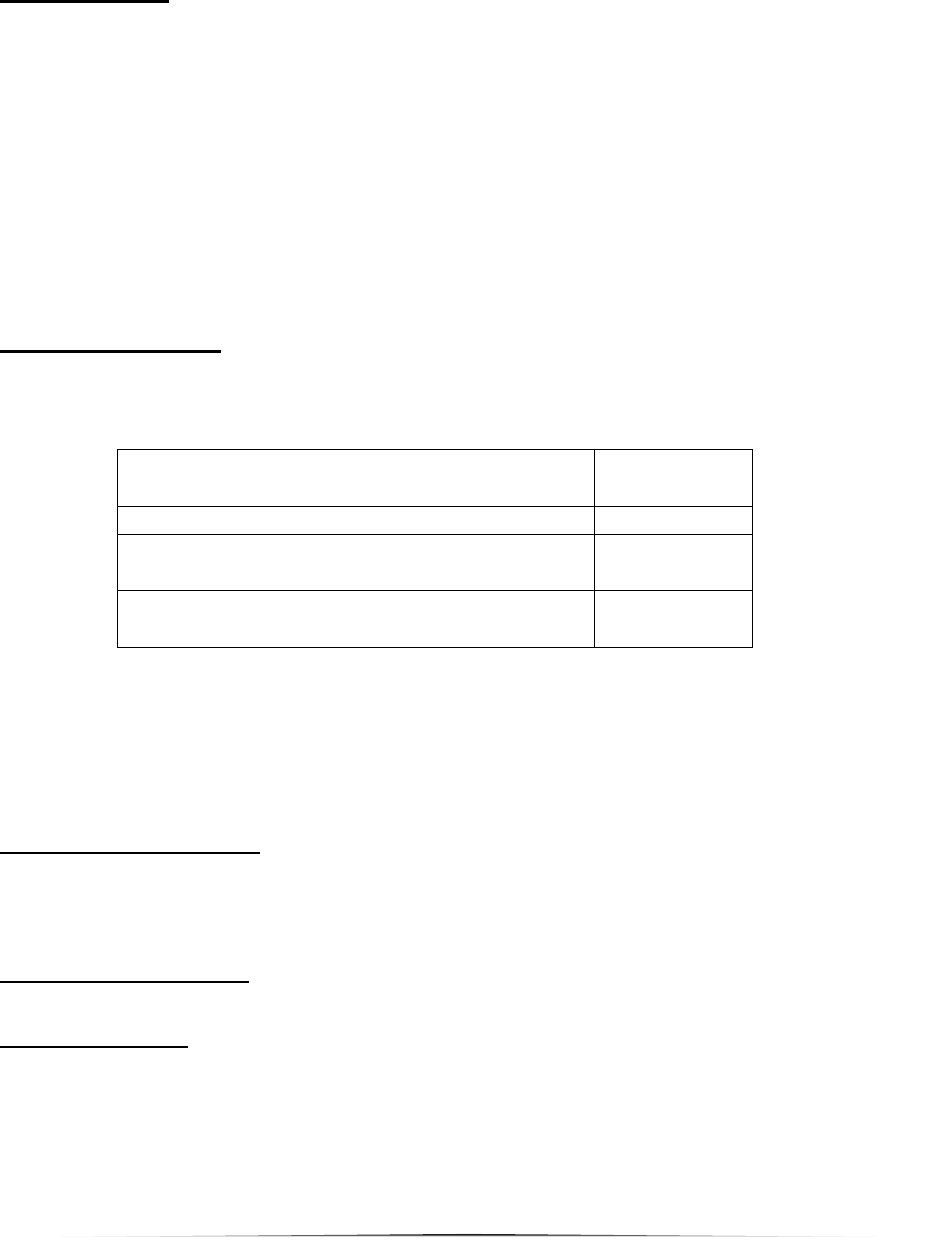
19
CURRICULUM
The curriculum outlines the things the students will be studying at school. All students are
required to study all of the subjects listed below during the school year.
• Language Arts/Spelling/Writing
• Mathematics
• Science/Health
• Social Studies
• Technology
• Music
• Physical Education
If you have any questions about the curriculum of the school, please contact Mrs. Terri Marcus at
the board of education office.
GRADING SYSTEM
Grades on the report card are reported as letter grades or as numeric grades, and are defined as
follows:
K– 5
th
GRADES PER QUARTER
Benchmarks, Performance Task, Posttest,
Special Projects
12-15
Class Participation/ Daily Assignments
18-20
Quizzes, Ticket out Door, Writing
Assignment
15
(suggested minimum)
# of grades per quarter
40
90 – 100= A
80 – 89= B
70 – 79= C
69 and BELOW= F
If schoolwork has been changed or modified from the regular class assignments, an asterisk
(*) will appear on the progress report or report card.
GRADE PERCENTAGE
–
Formal Assessments (Benchmarks, Performance Task, Posttest, Special Projects) - 40%
–
Class Participation/ Daily Assignments(Homework, Practice Task)- 30%,
–
Informal assessments (Quizzes, Ticket out Door, Writing Assignment) - 30%
PROGRESS REPORTS
Progress reports will be issued every 4 ½ weeks.
REPORT CARDS
The report card is a record of the student progress in each subject area. Students are graded based
on their performance on the following: (1) class participation, (2) daily assignments, (3)
homework assignments, (4) tests and quizzes, and (5) special projects/performance tasks. Report
cards will be picked up at the end of each nine weeks grading period by parent or legal
guardian. Report cards contain both academic and conduct grades. In addition, attendance is
reported.

20
HONOR ROLL
Honor roll will be announced at the end of each nine weeks. Requirements for honor roll are as
follows:
• Principal’s Honor Roll- All A’s (90 and above), S and P in every subject
• A/B Honor Roll- All A’s and B’s or All B’s (80 and above), S and P in every subject.
• Conduct shall be a S.
STANDARDIZED TESTING
•
Kindergarten: The Georgia Kindergarten Assessment Program (GKIDS) is
administered throughout the school year to all
Kindergarten students. The GKIDS
assesses a student individually in five areas: communicative skills, logical-mathematical
skills, physical skills, personal skills, and social skills. This assessment aids in
determining readiness for first grade.
•
Grades 3-5: Georgia Milestones measure how well a student has learned the knowledge
and skills outlined in the state adopted content standards in
• 3
rd
and 4
th
grade: language arts and math
• 5
th
grade: language arts, math, science, and social studies.
MAKE UP WORK
Students who have an excused absence have the privilege to make up missed class work. It is the
student’s responsibility to get the assignments from the teachers. Students will be allowed three
(3) days as soon as they return to get with the teacher to setup an opportunity to make-up missed
assignments. Students who are absent from school for an excused extended period of time may
be given special consideration.
Promotion/Retention
Promotion or retention of students can sometimes be a difficult decision.
•
Teachers and administrators will work with parents in the decision-making process to
determine what is best for each
individual student in grades K-5.
•
In addition, Clay County has adopted a Promotion/Retention Policy as required by State
of Georgia legislation.
In addition to the requirements previously established by the Clay County Board of Education,
students must pass the Georgia Milestones as listed below in order to be promoted to the next
grade. Students in grades 1 -5 must pass reading and/or math in order to be promoted to the next
grade.
1. Students in grades 3 and 4 will take the Georgia Milestones in Language Arts and Math.
Students in grade 5 will take the Milestones in all subject areas (Language, Math,
Science, and Social Studies).
Students who do not pass the main administration of the test may be offered remediation
prior to the end of the school year and an opportunity to re-take the failed areas. The re-
test will be developed locally with the exceptions of 3
rd
grade Reading/ELA Writing and
5
th
grade Reading/ELA/Writing and Math.
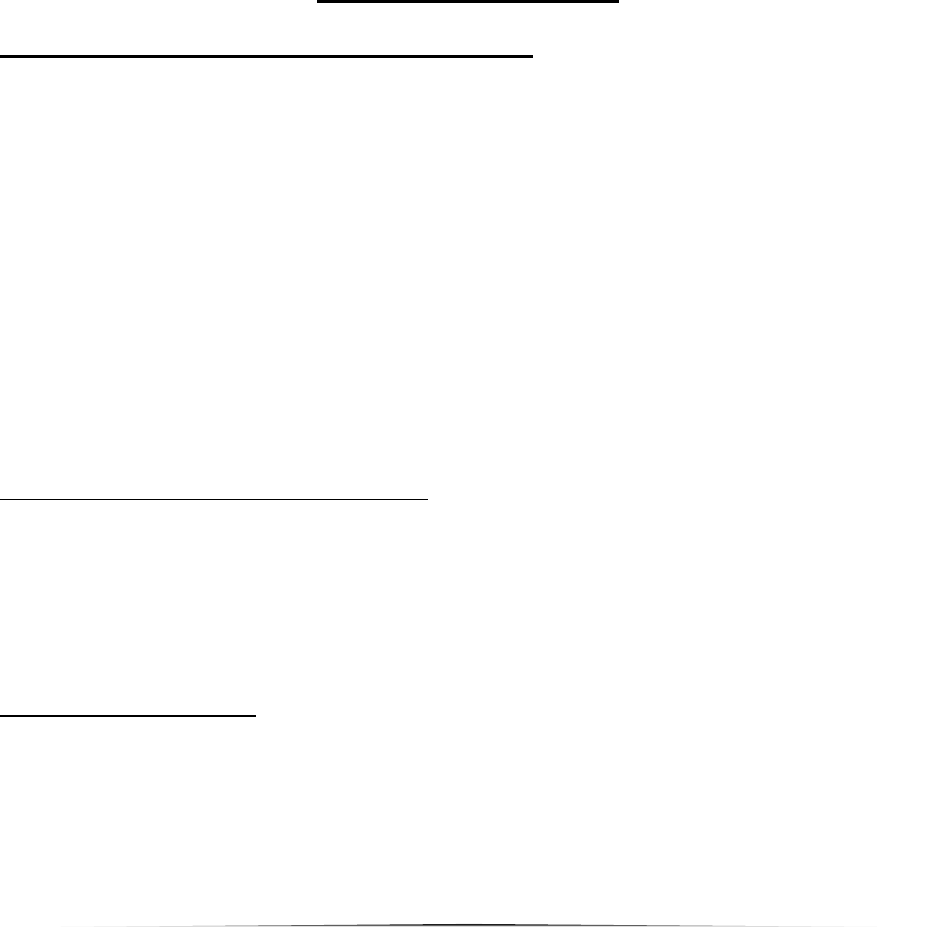
21
2. If funds are available, students in grades 3-5 who do not pass Reading/Language/Writing
and or Math or those who failed reading and/or math class will be offered summer
remediation and given another opportunity to retest.
3. Students who do not achieve a passing score on the retests or who fail two or more
classes for the year must come to an appeals meeting with a parent/guardian,
administrator, and/or other school officials. After reviewing the child’s performance on
the standardized tests, his/her classroom grades, attendance, behavior and other
considerations a decision will be made by the administrators and school personnel on the
committee. The decision of the appeals committee may be appealed to the
Superintendent by the parent or guardian.
ACADEMIC PLACEMENT:
PROMOTION, PLACEMENT, AND RETENTION
Effective the 2003-2004 school year, state law O.C.G.A. 20-2-282, the Promotion, Placement,
and Retention Rule, was implemented in Clay County Elementary School. This law requires that
it will be “the policy of the State of Georgia that the placement or promotion of a student into a
grade, class, or program should be based on an assessment of the academic achievement of the
student and a determination of the educational setting in which the student is most likely to
receive the instruction and other services needed in order to succeed and progress to the next
level of academic achievement.”
The placement committee will review the overall academic achievement of the student, and the
standards for promotion adopted by the Clay County Board of Education. A decision to
promote the student must be unanimous and must determine that, if promoted and provided
accelerated, differentiated, or additional instruction, the student will be likely to perform at grade
level expectations. Once the placement committee reports its decision, that decision will be
upheld by the Clay County Board of Education.
RESPONSE TO INTERVENTION – RTI
Response to Intervention (RTI) is a multi-tier approach to the early identification and support of
general education students with learning and behavior needs. Struggling learners are provided
with academic or behavioral interventions at increasing levels of intensity to accelerate their rate
of remediation. Student progress is monitored to assess both the learning rate and level of
performance of individual students. Educational decisions are made based on individual student
response to instruction.
SPECIAL EDUCATION
Special education services are available for eligible students. The Board of Education will
provide a free and appropriate education for students with disabilities whose parents or guardians
reside within the school system boundaries. Disabled students will be placed in the least
restrictive environment which will meet their needs through the school system’s special
education placement process.

22
GIFTED EDUCATION
The Georgia Department of Education’s Gifted Program is funded by the State of Georgia. In
Georgia, a gifted education student is defined as one who demonstrates a high degree of
intellectual and/or creative ability (ies), exhibits an exceptionally high degree of motivation,
and/or excels in specific academic fields, and who needs special instruction and/or special
ancillary services to achieve at levels commensurate with his or her ability (ies).
PARENTAL INVOLVEMENT:
The Parental Involvement Code of Conduct is based on the expectation that parents, guardians,
teachers, and school administrators
will work together to improve and enhance student behavior
and academic performance and will communicate freely their concerns
about, and actions in
response to, student behavior that detracts from the learning environment. School administrators
recognize that
two-way communication through personal contact is extremely valuable;
therefore, they provide information to parents as well as on-going opportunities for school
personnel to hear parents’ concerns and comments.
Parents and students should contact the principal of the school if specific questions arise related
to the Code of Conduct.
The Code of Conduct specifies within its standards of behavior various violations of the Code
which may result in a school staff
member’s request that a parent or guardian come to the school
for a conference. Parents are encouraged to visit the schools regularly
and are expected to be
actively involved in the behavior support processes designed to promote positive choices and
behavior.
Georgia law mandates that any time a teacher or principal identifies a student as a chronic
disciplinary problem student, the principal
shall notify by telephone call and by mail the
student’s parent or guardian of the disciplinary problem, invite the parent or guardian to
observe
the student in a classroom situation, and request at least one parent or guardian attends a
conference to devise a disciplinary
and behavioral correction plan.
• Georgia law also states that before any chronic disciplinary problem student is
permitted to return to school from a suspension or
expulsion, the school shall
request by telephone call or by mail at least one parent or guardian to schedule and
attend a conference to
devise a disciplinary and behavioral correction plan.
• The law allows a local board of education to petition the juvenile court to require a
parent to attend a school conference. If the court
finds that the parent or guardian
has willfully and unreasonably failed to attend a conference requested by the
principal pursuant to the
laws cited above, the court may order the parent or
guardian to attend such programs or such treatment as the court deems appropriate
to improve the student’s behavior. After notice and opportunity for hearing, the
court may impose a fine, not to exceed $500.00, on a
parent or guardian who
willfully disobeys an order of the court under this law.

23
MEDIA CENTER:
The Media Center is open from 7:30 – 3:30 each day.
Students should use the media center for the purpose of research, pleasure reading, and/or other
class-related activities. Socializing and loitering in the center are inappropriate behaviors for
Clay County Elementary School students. Students who seem to have no defined purpose for
being in the center, who are not busy, or who are disruptive will be asked to leave the center and
will be subject to disciplinary action. Students are asked not to check out books for other
students. Students should return all books and other materials promptly so that others may use
them.
LIBRARY BOOKS
Library books are furnished to your child by the school system on a loan basis, and should be
treated as borrowed property. Students
must pay for the loss or abuse of library books.
Kindergarten students may check out one book at a time. Students in grades 2-5 may
check out
two books at a time.
ACCELERATED READER (AR) PROGRAM
•
The Accelerated Reader program combines technology and research to increase
independent reading. The child first reads (or
has read to him/her) a book from the
Accelerated Reader book list. The child then takes a computerized test on the book,
answering simple multiple-choice questions that check the child’s recall of basic facts and
events in the book.
•
After finishing the test, the child receives a point score based on the difficulty level of the
book and the number of questions
he/she answered correctly.
•
The computer keeps track of each student’s points/percent of goal, reading level, and test
percentages. This is valuable
information for teachers.
•
A student’s points/goals also serve as the basis for various rewards.
myOWN READER PROGRAM
• A personalized library for every student
• Enhanced digital books, enhanced reading growth
• Simply increasing students’ access to reading materials can increase reading engagement
and, in turn, reading growth. With myON Reader, students get access to thousands of
digital books—and so much more. From robust scaffolds that help students build reading
and writing skills to customizable assignments and reports to help teachers nurture and
monitor their progress, myON Reader helps you supercharge reading growth for every
learner.
SCHOOL COUNSELING PROGRAM
SCHOOL COUNSELOR
The Clay Schools counseling program is committed to providing a comprehensive,
developmental guidance program that will enable each student to become a lifelong learner enter
the workforce with the necessary skills to achieve academic and personal potential.
School personnel and parents/guardians my request the services of the counselor to assist
students dealing with academic, social/emotional, behavioral and/or attendance issues.
Appointments or conferences with the counselor should be prearranged whenever possible.

24
All teacher counseling referrals are to be referred using a school counseling referral from.
Students must have a pass to see the counselor.
BEHAVIOR/DISCIPLINE:
STUDENT CODE OF CONDUCT
Students shall:
• Respect authority, including teachers, administrators, bus drivers and other school
employees.
• Respect each other.
• Attend school daily, except when excused.
• Be on time for school and class.
• Pursue and attempt to complete the course of study prescribed by the state and local
school authorities.
• Protect and take care of the school’s property and the property of others.
• Dress and groom to meet fair standards of health and the school dress code.
• Avoid the use of indecent or obscene language, both written and oral.
• Avoid conduct that will demeanor or slander others.
• Be prepared for school each day.
• Refrain from bringing dangerous objects (knives, guns, or anything that resembles a
weapon) on school property.
• Leave commercial items, junk foods, and/or toys at home, unless instructed to bring
them by a teacher.
• Walk quietly in line when moving from place to place.
• Refrain from the use and/or possession of tobacco products and drugs.
Students suspended from a bus will not be allowed to ride another bus during the suspension.
Students are expected to observe and abide by these rules at all times while in and about school
buses. The disciplinary actions listed on page 31-32 are consequences to be applied according to
the seriousness of the offense.
The Clay County Elementary School staff recognizes that self-discipline promotes learning and
that a safe, orderly and secure learning environment is an essential component of an effective
schooling. Our goal is to educate. However, when the behavior of an individual student
conflicts with the rights of others, corrective actions may be necessary for the benefit of that
individual and the school as a whole. In this regard, a school-wide discipline program has been
established which is applicable in school, on school grounds, on property used by the school, on
the school bus, on school-sponsored field trips, and on the way to and from school.
Various forms of corrective actions will be used depending upon the nature and the
severity of the infraction. Some of these may include:
• Corporal punishment
• Counseling by administration and/or counselor
• Parent/teacher conference
• Lunch detention

25
• Denial of participation in school activities
• In-school suspension
• Alternative school
• Out of school suspension
• Expulsion with possible criminal prosecution
SCHOOL-WIDE BEHAVIOR PROGRAM (PBIS)
Positive Behavioral Intervention Support (PBIS) is a behavior management program adopted by
the Clay County School System.
PBIS is recommended by the Georgia Department of
Education. It is a proactive behavioral plan, which rewards and reinforces good
behavior.
The students at Clay County Elementary School are taking the initiative to practice and follow
school-wide expectations through the PBIS (Positive Behavior Interventions and Supports)
program. This program was adopted by our school to help students with positive behavior
expectations. The vision of the Clay County PBIS program is for HAWKS to SOAR (Be: Safe,
On time, Accountable, and Respectful). When students are caught following the SOAR
expectations they are rewarded for making good choices. Each week students are taught a
SOAR expectation.
STATE DISCIPLINARY POLICIES
•
The Georgia General Assembly has amended Code section 20-2-735 to require language
be placed in the student code of
conduct to “encourage parents and guardians to inform
their children on the consequences, including potential criminal
penalties, or underage
sexual conduct and crimes for which a minor can be tried as an adult.”
HALLWAYS, GYMNASIUM, CAFETERIA
In order that everyone can enjoy a pleasant learning and working environment, students are to
maintain a low level of noise as they move through the halls. Shouting, congregating, and
“carrying on” disturb others. Students should talk in a normal tone of voice and move to their
destination as quickly and efficiently as possible. When students move through the halls during
lunch or connection classes, they are expected to conduct themselves properly, be courteous and
well behaved. In assemblies, students are expected to be on their best behavior for any guest,
speakers, or presenters. Students should be silent as they enter the assembly area and should
show appreciation in the proper manner and at the proper time. Appropriate and courteous
behavior at school is the expectation for all students.
HALL PASSES
Students are not to be out of class unless they have a hall pass. Each student must have a hall
pass in his/her possession specifying their destination when they are in the halls without adult
supervision, the signature of the teacher giving permission, and the time the student left class.
Students without passes will be escorted back to class. Students should be out of class only in
cases of emergency or to participate in an approved educational activity outside of the classroom.

26
PROGRESSIVE DISCIPLINE PROCEDURES
When it is necessary to impose discipline, school administrators and teachers will follow a
progressive discipline process. The degree of discipline to be imposed by each school official
will be in proportion to the severity of the behavior of a particular student and will take into the
account the student’s discipline history.
The Code of Conduct provides a systematic process of behavior correction in which
inappropriate behaviors are followed by consequences. Disciplinary actions are designed to teach
students self-discipline and to help them substitute inappropriate behaviors with those that are
consistent with the character traits from Georgia’s Character Education Program.
The following disciplinary actions are imposed for violation of this Code of Conduct:
• Warning and/or Counseling with a School Administrator or Counselor
• Loss of Privileges
• Isolation or Time Out
• Clean up the lunchroom
• Temporary Removal from Class or Activity
• Notification of Parents
• Parent Conference
• Detention (lunch)
• Short-term Suspension
• Referral to Tribunal for Long-term Suspension or Expulsion
• Suspension or Expulsion from the School or Bus
CORPORAL PUNISHMENT MAY BE ADMINISTERED AT THE DISCRETION OF
THE ADMINISTRATOR WITH SIGNED PERMISSION FROM A PARENT ON THE
APPROPRIATE FORM.
Referral to Law Enforcement or Juvenile Court Officials: Georgia law requires that certain acts
of misconduct be referred to the appropriate law enforcement officials. The school will refer any
act of misconduct to law enforcement officials when school officials determine such referral to
be necessary or appropriate.
BEHAVIOR CODE
The following behaviors are prohibited at school, at any school-sponsored activity or event, or
while on a school bus:
1. Behavior that interferes with learning, including disrespect and failure to follow
reasonable directions.
2. Bus misconduct (refer to Bus Conduct).
3. Damaging school property or the property of others.
4. Damaging or setting off a fire alarm (except in cases of fire on school premises).
5. Dishonesty.
6. Distribution, use, access, upload, or download of vulgar, obscene, or threatening
materials and/or graphics.

27
7. Fighting.
8. Leaving a class or the school without permission.
9. Physical contact that is inappropriate.
10. Possessing or using tobacco or any smoking paraphernalia.
11. Possessing, using, selling, buying, giving away, bartering or exchanging any alcoholic
beverage or illegal drug.
12. The misuse of technology (refer to Electronic Resources – Authorized User Policy).
13. The sale, give-away, barter, exchange or distribution of any food, non-prescriptive or
prescriptive drugs, materials, substances, toys, or other personal belongings without the
consent of the principal or the principal’s designee.
14. Theft.
15. Throwing objects on school property.
16. Using inappropriate language, whether written or spoken.
17. Verbally or physically abusing teachers, administrators, students, or any other person,
including but not limited to, acts of sexual harassment, threats or intimidation.
18. Violating any school or school system rule.
PHYSICAL ABUSE OF SCHOOL PERSONNEL
Georgia law prohibits students from committing physical acts of violence against school
personnel (teachers, bus drivers, or other school officials or employees). The law defines
physical violence and establishes consequences for such acts, as follows:
•
Intentionally making physical contact of an insulting or provoking nature with school
personnel.
An elementary school student who is alleged to have committed such an act will be suspended
pending a hearing by a tribunal. A student found by a tribunal to have committed such an act will
be expelled from school for the remainder of his/her eligibility to attend public school and will
be referred to juvenile court. The Clay County Board of Education has the discretion to follow
the recommendation of the tribunal or to impose penalties not recommended by the tribunal.
AUTHORITY OF THE PRINICIPAL
The principal is the designated leader of the school and, in concert with the staff, is responsible
for the orderly operation of the school.
In cases of disruptive, disorderly, or dangerous conduct
not covered in this Code, the principal may undertake corrective measures
which he or she
believes to be in the best interest of the student and the school provided any such action does not
violate school board
policy or procedures.
AUTHORITY OF THE TEACHER
The superintendent fully supports the authority of principals and teachers in the school system to
remove a student from the classroom
pursuant to provisions of state law. Each teacher shall
comply with the provisions of O.C.G.A. § 20-20-737 which requires the filing
of a report by a
teacher who has knowledge that a student has exhibited behavior that repeatedly or substantially
interferes with the
teacher’s ability to communicate effectively with the students in his or her
class or with the ability of such student’s classmates to
learn, where such behavior is in violation
of the student Code of Conduct. Such report shall be filed with the principal or designee on
the

28
school day or the following school day of the most recent occurrence of such behavior, shall not
exceed one page, and shall
describe the behavior. The principal or designee shall, within a
reasonable amount of time, notify in writing the teacher and the
student’s parents or guardian of
the discipline or student support services which has occurred as a result of the teacher’s report.
This
written notification shall include information as to how the parents or guardian may contact
the principal or designee.
ALTERNATIVE PLACEMENT - IN SCHOOL SUSPENSION (ISS)
The Alternative Placement (ISS) is designed to isolate students assigned to this program from the
regular classroom and from participation in activities of the school. It is designed to help them
continue progress relative to classroom assignments and to provide individually oriented
instruction in essential skills and knowledge areas in which low achievement levels may be
contributing to the student’s adjustment problems. Students are assigned to Alternative
Placement for various discipline-related matters for a specified amount of time. Unacceptable
behavior in the Alternative Placement setting will not be tolerated and may result in additional
disciplinary action. Students assigned to the Alternative Placement (ISS) program or who are
suspended from school may not attend any school function, including field trips and other
activities, and may not practice or represent the school in any extracurricular activity. Students
will not be allowed to return to class after an OSS assignment unless a parent/guardian
conference is held with an administrator. Placement in ISS or Suspensions from school or a
bus can only be done by the Principal, Assistant Principal or designee.
ISS EXPECTATIONS
1. Students report to the ISS room upon arrival to school or period assigned.
2. Students who miss any ISS time due to early dismissal, tardiness, absence, or emergency
school closing will make up the time missed on the next day of attendance.
3. Restroom breaks are provided periodically.
4. Students eat breakfast and lunch in the ISS room.
5. Students must bring pencils, pens and paper to ISS.
6. All school rules apply in ISS.
7. Students will remain seated in assigned seats and complete assignments, behavioral
packets, or read appropriate material.
8. Talking or interfacing with other students, sleeping, lounging, placing head on desk, and
eating or drinking at any time other than lunch is not allowed.
9. Participation in or attendance at any extracurricular activity from the time the ISS is
assigned until the next school day after completion will not be permitted.
10. Students violating the ISS rules could result in additional days in ISS, OSS and/or loss of
ISS as an option for disciplinary actions.
DEFINITION OF TERMS:
Assault: Any threat or attempt to physically harm another person or any act which reasonably
places another person in fear of
physical harm. (Example: threatening language or swinging at
someone in an attempt to strike)
Battery: Intentionally making physical contact with another person in an insulting, offensive, or
provoking manner or in a way that
physically harms the other person (Example: fighting)

29
Bullying: In accordance with Georgia law, bullying is defined as an act which occurs on school
property, on school vehicles, at
designated school bus stops, or at school related functions or
activities, or by use of data or software that is accessed through a
computer, computer system,
computer network, or other electronic technology of a local school system, that is:
1.
Any willful attempt or threat to inflict injury on another person, when accompanied by
an apparent present ability to do so; or
2.
Any intentional display of force such as would give the victim reason to fear or expect
immediate bodily harm; or
3.
Any intentional written, verbal, or physical act, which a reasonable person would
perceive as being
intended to threaten,
harass, or intimidate, that:
A.
Causes another person substantial physical harm within the meaning of Code Section
16-5-23.1 or visible bodily harm as
such term is defined in Code Section 16-5-23.1;
B.
Has the effect of substantially interfering with a student’s education;
C.
Is so severe, persistent, or pervasive that it creates an intimidating or threatening
educational environment; or
D.
Has the effect of substantially disrupting the orderly operation of the school.
Chronic Disciplinary Problem Student: A student who exhibits a pattern of behavioral
characteristics which interfere with the
learning process of students around him or her and
which are likely to recur.
Corporal Punishment: Physical punishment of a student by a school official in the presence of
another school official.
Detention: A requirement that the student report to a specified school location and to a
designated teacher or school official to make up work missed. Detention may require the
student’s attendance before school or after school. Students are
given one day’s notice so that
arrangements for transportation can be made by the parents or guardians.
Disciplinary Tribunal: School officials appointed by the Board of Education to sit as fact
finders and judge with respect to student
disciplinary matters.
Dress Code: The current dress code is explained in the student handbook.
Drug: The term drug does not include prescriptions issued to the individual, aspirin or similar
medication and/or cold medications
that are taken according to product use recommendations
and board policy. Caffeine pills are considered drugs.
Expulsion: Suspension of a student from a public school beyond the current school quarter or
semester. Such action may be taken
only by a disciplinary tribunal.
Extortion: Obtaining money or goods from another student by violence, threats, or misuse of
authority.

30
Gambling: Engaging in a game or contest in which the outcome is dependent upon chance even
though accompanied by some skill,
and in which a participant stands to win or lose something
of value.
Hazing: Any conduct which subjects another person, whether physically, mentally,
emotionally, or psychologically, to anything that
may endanger, abuse, degrade, or intimidate
the person as a condition of association with a group or organization, regardless of the
person’s
consent or lack of consent.
In-School Suspension: Removal of a student from class or regular school program and
assignment of that student to an alternative
program isolated from peers.
Physical Violence: Intentionally making physical contact of an insulting or provoking nature
with the person of another; or
intentionally making physical contact which causes physical
harm to another.
Suspension: Removal of a student from the regular school program for a period not to exceed
10 days (short-term) or for a period
greater than 10 days (long-term, which may be imposed
only by a disciplinary tribunal). During the period of suspension, the student is excluded from
all school-sponsored activities including practices, as well as competitive events, and/or
activities sponsored by the
school or its employees.
Theft: The offense of taking or misappropriating any property of another with the intention of
depriving that person of the property
regardless of the manner in which the property is taken or
appropriated.
Truant: Any child subject to compulsory attendance who during the school calendar year has
more than five days of unexcused
absences.
Weapon: The term weapon is defined as any object which is or may be used to inflict bodily
injury or to place another in fear for
personal safety or well-being. The following may be
defined as dangerous weapons: any pistol, revolver, or any weapon designed or
intended to
propel a missile of any kind; or any dirk, bat, club, or other bludgeon-type weapon, any stun
gun or taser, bowie knife,
switchblade knife, ballistic knife, any other knife, straight-edge razor
or razor blade, spring stick, metal knucks, chains, blackjack, or
any flailing instrument
consisting of two or more rigid parts connected in such a way as to allow them to swing freely,
which may be
known as a nunchaku, or fighting chain, throwing star, or oriental dart, or any
weapon of like kind.
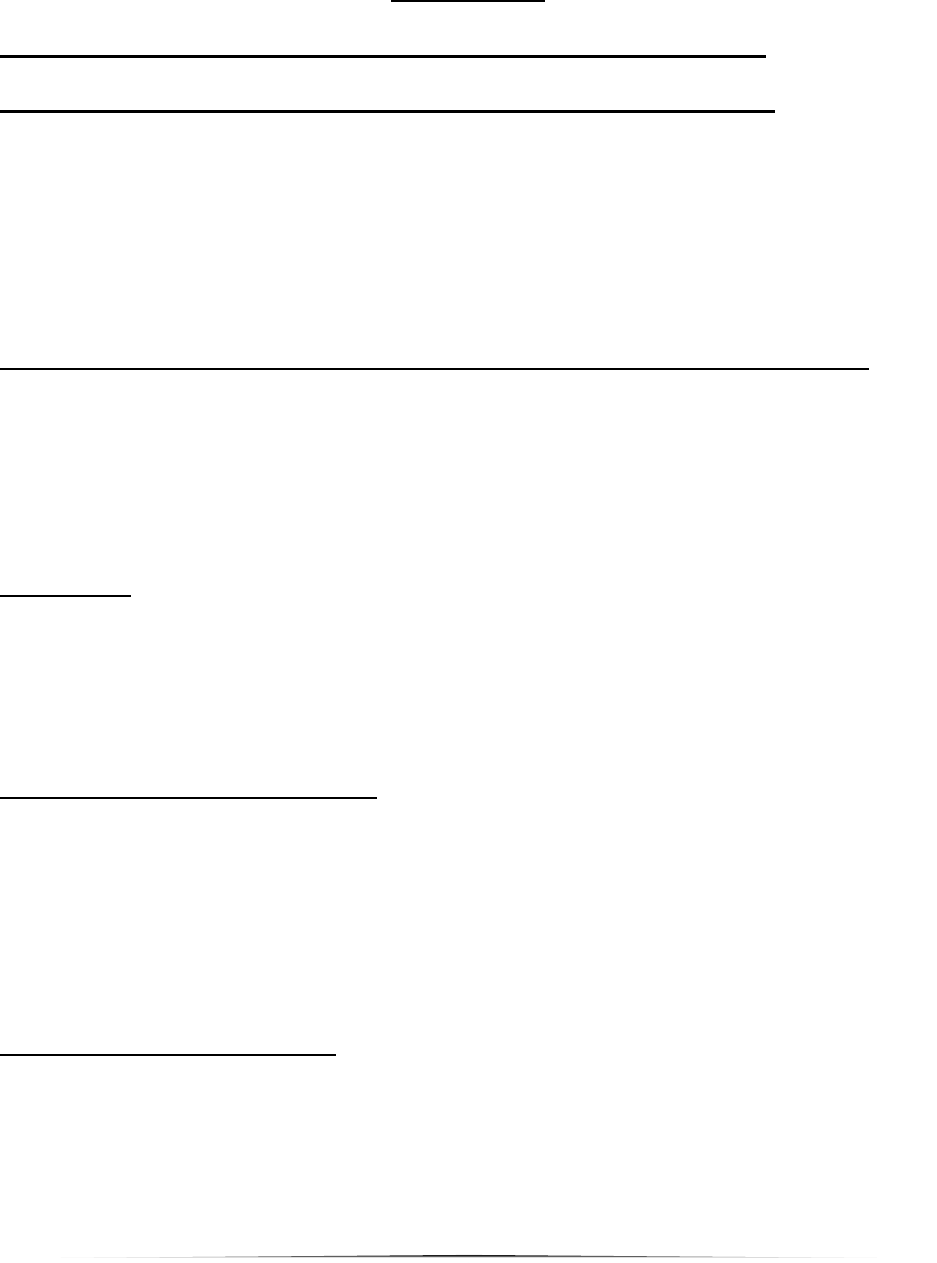
31
Discipline Plan
Disciplinary Actions the classroom teacher will be responsible for handling
NOT FOLLOWING INSTRUCTIONS/DIRECTIONS FROM AN ADULT - Coming to
class without materials, talking, gum chewing/eating, horseplay, dress code violations, not
completing work, disruption of class (minor) and failure to follow directions immediately.
• 1st Offense warning
• 2nd Offense conference with student/informal administration referral
• 3rd Offense parent contact (phone or letter)
• 4th Offense out of class isolation/loss of privileges/silent lunch
• 5th Offense formal office discipline referral
FORGERY ON PARENT NOTES AND/OR PROVIDING FALSE INFORMATION –
Student provides knowingly false information to a teacher or staff member or forges his or her
parent’s signature on a document, report card, graded assignment, etc.,
• 1st Offense Warning
• 2nd Offense Written assignment, parent contact
• 3rd Offense Administrative or counselor conference with the student
• 4th Offense Parent Conference requested
CHEATING – Student caught cheating on a test or any school assignment
• 1st Offense Conference with the student
• 2nd Offense Referral to counselor and conference with parent,
• 3rd Offense Referral to counselor, conference with parent, receives a zero
• 4th Offense Formal office discipline referral (1 day ISS)/receives a zero
• 5th Offense 2 days ISS/ receives a zero
TARDINESS TO SCHOOL/CLASS – Tardiness is defined as (1) being late to school or (2)
being late to class without permission. Tardiness occurs when a student is not in the classroom
by 8:05 a.m.
• 1
st
Offense Warning
• 2
nd
Offense Notify parents
• 3
rd
Offense Unexcused absence/notify parents
• 4
th
Offense Parent Conference requested
• 5
th
Offense Notify parents/DFACS
CAFETERIA DISTURBANCES - Willful violation of procedures set up for proper cafeteria
operation:
• 1st Offense warning
• 2nd Offense 1 day silent lunch
• 3rd Offense 2 day silent lunch
• 4th Offense 3 day silent lunch
• 5th Offense formal office discipline referral

32
COMPUTER TRESPASSING – Students who enter chat rooms, view or bring pornography to
school, provide personal information or sending messages over the web, or attempt to authorize
inappropriate websites will receive the following:
• 1st Offense warning
• 2nd Offense 10 day loss of computer privilege
• 3rd Offense 20 day loss of computer privilege
• 4th Offense 30 day loss of computer privilege
• 5th Offense loss of computer privilege for year
DRESS CODE VIOLATION
• 1st Offense warning
• 2nd Offense warning/parent contact
• 3rd Offense Parent conference requested
• 4th Offense ISS until appropriate clothing are received
• 5th Offense ISS until appropriate clothing are received
LEVEL I OFFENSES
Skipping or leaving class without permission –Student does not report to his/her assigned class
or the location specified by the teacher. Skipping is also defined as being in an area of the school
without permission. Student may not leave class without permission.
• 1st Offense Warning
• 2nd Offense Refer to counselor and parent meeting
• 3rd Offense 1 day ISS, parent contact
• 4th Offense 2 days ISS
• 5
th
Offense 3 days ISS
Petty Theft/Stealing – administrative decision depending on the severity of the theft
• 1st Offense Refer to counselor, parent contact
• 2nd Offense 1 day ISS, parent contact
• 3rd Offense 2 days ISS
• 4th Offense 3 days ISS
Conduct at Extra-Curricular Activities -Students that violate accepted rules of conduct on field
trips, at games and events
• 1st Offense warning/parent contacted
• 2nd Offense Loss of activity privileges
• 3rd Offense Loss of activity privileges
Electronic Devices/Toys-Devices such as, but not limited to: cell phones, beepers, CD or MP3
players, IPods, laser light devices, radios, tape players, water guns and other types of toys and
electronic devices
• 1
st
- 5
th
Offense Item confiscated (parent may pick-up)

33
LEVEL II OFFENSES
Profanity/Abusive or Explicit Language/Horseplay/Scuffling - Language or gestures that are
profane, obscene, or suggestive is unacceptable/physical contact to include pushing, hitting,
spitting, or shoving will result in the following consequences.
• 1st Offense Warning and Refer to counselor
• 2nd Offense 1 day ISS, parent contact
• 3rd Offense 2 days ISS and Parent Contact
• 4th Offense 3 days ISS and Parent Contact
Open Defiance/Disrespect of School Authority – Repeated failure to follow instructions of a
faculty member, threats, intimidation of a physical/verbal nature, or comments or gestures of an
obscene nature directed at a faculty member
• 1st Offense Refer to counselor and parent called
• 2nd Offense Refer to counselor, 1day ISS, parent contact,
• 3rd Offense Refer to counselor, 2 days ISS, parent contact
• 4th Offense 1 day OSS
Public Display of Affection – Kissing, hugging, touching, etc., will not be allowed at CCES.
• 1st Offense Warning, parent contact
• 2nd Offense Refer to counselor, 1 day ISS, parent contact
• 3rd Offense 2 days ISS
• 4th Offense 3 days ISS
LEVEL III OFFENSES
Fighting - Mutual combat in which both parties have been involved regardless of who threw the
first punch.
• 1st Offense Refer to counselor, 1 day ISS or corporal punishment, parent contact
• 2nd Offense Refer to counselor, 2 day ISS, parent contact
• 3rd Offense 3 days ISS
• 4th Offense 1 day OSS/Refer to tribunal
Tobacco Use/ Damaging School or Personal Property/ Theft - Using, or in possession of tobacco
products/ damage due to carelessness or inadvertent actions/ stealing or attempting to steal personal or
school property
• 1st Offense 3 days ISS or corporal punishment, parent contact,
• 2nd Offense Refer to counselor, 5 day ISS, parent contact
• 3rd Offense 1 day OSS
• 4th Offense 2 days OSS/Refer to tribunal
Bullying/ Threatening an employee(adult) – refers to an act which occurs on school property, on school
vehicles, at designated school bus stops, or at school related functions or activities, or by use of data or
software that is accessed through a computer, computer system, computer network, or other electronic
technology at school/ Threatening another student or intimidating any student.
• 1st Offense 3 days OSS parent contact
• 2nd Offense 5 days OSS, parent contact

34
• 3
rd
/Repeated Offense 10 day OSS/Refer to Tribunal
Assault of Staff/ Gambling/ Active Sexual Activity - Any physical action taken toward a staff
member/student engages in an activity such as card playing, rolling dice, or other games of chance in
which a wager (either monetary or another form of exchange)/students participating in sexual activity of
any type on school premises or at school-sponsored activities.
• All Offenses Suspended until Tribunal (Criminal charges may be made)
Drug Possession - Possession of, or under the influence of controlled substances, chemicals/substances
not intended for internal use, prescription medicine issued to another person, other substances that are
represented to be illegal drugs, or alcoholic beverages while on school grounds or at any activity where
students are representing CCES.
• All Offenses Suspended until Tribunal (Criminal charges may be made)
Weapons- (See definition) Possession of any item that can be used to cause distinct harm to people such
as pistols, rifles, shotguns, bows, crossbows, spring loaded knives, knives and other harmful items as
determined by the Principal as illegal to have on/in school grounds/facilities
• All Offenses Suspended until Tribunal (Criminal charges may be made)
LEVEL I BUS OFFENSES
Failure to stay in your seat
Refusal to sit in assigned seat
Eating, drinking on the bus, littering, or possessing electronic devices
Failure to keep hands and head inside the bus
Throwing items on the bus or out of the bus window
Refusing to following safety measures for COVID-19
• 1
st
offense Warning
• 2
nd
offense 3 days bus suspension, refer to counselor
• 3
rd
offense 4 days bus suspension
• 4
th
offense 5 days bus suspension
LEVEL II BUS OFFENSES
Using profanity or vulgar language or inappropriate gestures
Horseplay, shoving, pushing, spitting on other students, threatening/harassing other students,
teasing other students
Fighting on the School Bus
Destroying school property or vandalizing the bus
• 1
st
offense 3 days bus suspension, refer to counselor
• 2
nd
offense 5 days bus suspension
• 3
rd
offense 7 days bus suspension
• 4
th
offense 10 days bus suspension
• 5
th
offense Suspension from bus for remainder of year
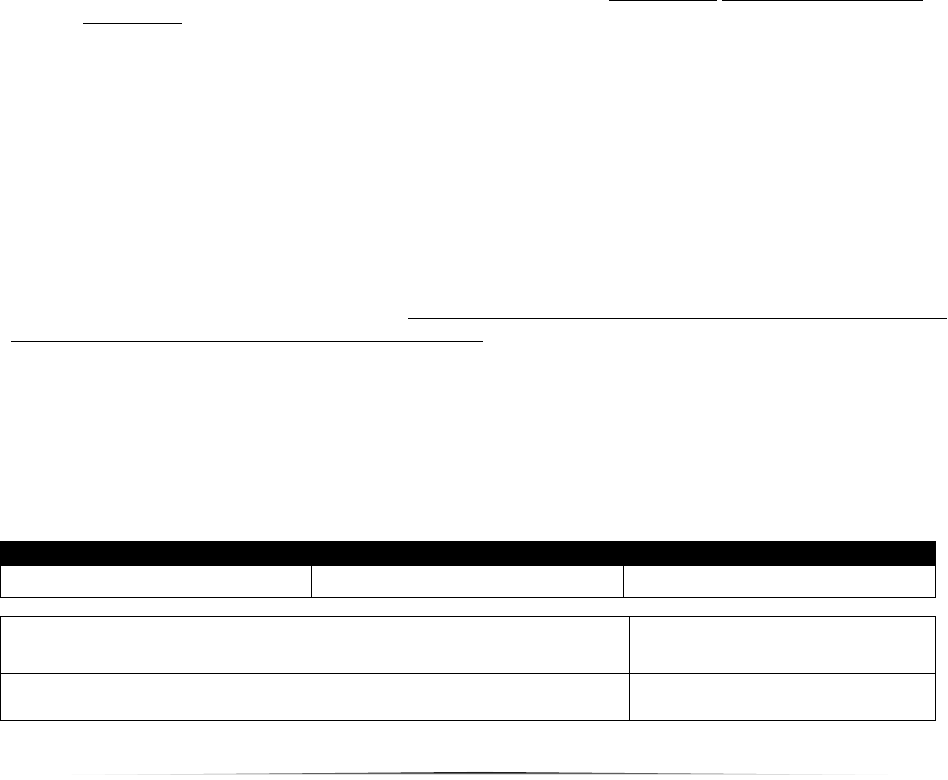
35
Student Device Loan Agreement and Expectations for Responsible Device Use
Student Device Loan Agreement
The Clay County School System (“CCSS”) provides devices to students to enhance their education. It is imperative
that parents/guardians stress to their children how important it is to take good care of their issued device and to
behave appropriately when interacting with others digitally. Certain rules are necessary to protect the device and the
school network and ensure that this technology serves as an effective instructional tool. By accepting possession of
a CCSS device, students and his/her parents/guardians agree to the following responsibilities for the use and care of
this device.
1. The student agrees to follow all CCSS policies and regulations governing the use of computers, including,
but not limited to, the Expectations for Responsible Device Use printed on the back of this form, as well as
the Acceptable Use Policy and the Student Code of Conduct.
2. The computer is the property of CCSS. If a student withdraws from the school prior to the end of the loan
period, the device must be returned to school officials by the student prior to withdrawal.
3. The student shall not remove or alter any CCSS identification labels attached to or displayed on the
computer, nor shall the student change identification within the computer, such as the computer name.
4. The student agrees to keep the computer secured and safe. The parent/guardian will assume the risk of loss
by theft, destruction, or damage caused by intentional misuse. If, during the loads period, the computer is
damaged or returned with any accessories missing, CCSS may charge the parent the lesser of the repair or
the replacement cost.
5. The student must report theft (or suspected theft) of the computer, loss of the computer, damage to the
computer, or malfunctioning of the computer to school personnel promptly and no later than 24 hours of
the incident.
6. Upon request, the student agrees to deliver the computer to CCSS staff for technical inspection, to verify
inventory or other information or for random screening.
7. The device cannot be loaned, sold, bartered, traded, leased, rented or given to any other person or persons
without the express written consent of CCSS.
I have read and agree to comply with these rules and all CCSS policies and regulations for the use of equipment,
including the attached Rules, the Acceptable Use Policy, and the Student Conduct Code. I understand that the
device is the School Division’s property and it may access, monitor, and archive my use of the computer system,
including my use of the internet, e-mail and downloaded material, without prior notice to me. I accept responsibility
for damage to or loss of the equipment delineated below while assigned to me. I understand that if the computer or
any accessory is lost, damaged or stolen, student and his/her parent/guardian is responsible for the repair or
replacement cost. I will report any damage to hardware or software immediately to designated school personnel and
will return equipment promptly when requested. Parents wishing to Opt Out of the device program must contact the
school and an Opt Out form will be provided for signature.
CCCS grants permission to the student to have limited use or the device described in this continuing agreement.
The school system insurance AND the permission granted to the student ceases on the LAST CALENDAR DAY
OF THE SCHOOL YEAR (unless terminated earlier by CCSS) and failure to return the device and charger on or
before that date to the building principal or his/her designee could result in billing for the unreturned item(s) and/or
other legal proceedings against the student and/or the person who has the device. Device bags will be issued to each
student with issuance of the first device and will remain with the student for the duration of program participation.
CCSS reserves the right to demand return of the device at any time.
School
Grade
Homeroom Teacher
Student’s Full Name and Address (please print)
Date
Signature of Parent or Guardian
Date

36
Student Device Loan Agreement and Expectations for Responsible Device Use
Expectations for Responsible Device Use
Initial after each statement below, agreeing to the CCSS Expectations of Responsible Device Use.
1. I understand that as CCSS property, the device is subject to inspection and search at any time and
without cause. ______
2. I understand that I am not to remove or alter any part of the computer. _____
3. I understand that only authorized educational programs installed by CCSS staff may be used on the
device, and that I am not to download, install or play games, video, music or pictures unless they are
directly related to classroom instruction. _____
4. I understand that I am accountable for knowing where my device is at all times. _____
5. I understand that I am responsible for the proper care of my device, that the device must be in the
case provided by CCSS when not in use, and that damage to the device when it is not in the protective
case may be considered intentional. ______
6. I understand that I am not to add or remove labels to the device, that I am not allowed to personalize
it with stickers, decals, markers or any type of decorative materials, and that no paint, glue or other
substance is to be placed on the device. _____
7. I understand I am responsible for keeping food and beverages away from my device and that I am not
to leave my device outside, unattended in a vehicle, in an unsecure location, or near water. ______
8. I understand that I am to avoid using objects that may scratch or damage any part of the device.
_____
9. I understand that I am to turn my device off when finished using it, especially before traveling to or
from school. ______
10. I understand that I am not to loan my device or charger to other individuals. _______
11. I understand my device's serial number and manufacturer/district labels are not to be defaced.
_____
12. I understand I am not to delete any school-installed software. ______
13. I am understanding that I am only to use my device in ways that are educational and appropriate and
in accordance with all policies and procedures, including the Acceptable Use Policy and the Student
Code of Conduct. ______
14. I understand that I represent the school division in all my online activities while using the device. I
understand that what I do online on the CCSS device should not reflect negatively on my fellow
students, teachers, or Clay County School System.
15. I understand that I am to interact with all others in a respectful, courteous, and school-appropriate
manner while using the device. ______
16. I understand that my personal username and password must not be shared with any individual.
_____
17. I understand that I am to follow the CCSS Acceptable Use Policy at all times. _______
18. I agree to return the device, case and power cord in good working order at the end of the school
year, upon leaving CCSS, or when my user privilege is revoked. ______
19. I understand that I am to bring my device to class each day fully charged. ________
20. I understand that the condition of my device is NEW or Good and when I return the device to the
school it should be still in good condition. ______

37
LEGAL NOTIFICATIONS:
Title I
CCES Elementary is a Title I school operating a School-wide program. Federal funds received by our
school are spent to help
close the achievement gap and help students meet challenging state standards.
Research shows that parental involvement is a key
factor in the academic success of students. Parents are
encouraged to learn about our school’s educational program, as well as our
educational goals and
objectives. As a Title I school, CCES provides access to educational materials and resources to help
parents learn more and be involved in the educational process. Clay County Elementary School’s Title I
Parent Involvement and
School-wide plans are on file in the school office, the school media center, the
school system’s website, and at the Clay County
Board of Education office, if you would like to review
them. Please contact the office if you have any questions.
PERSONNEL REQUIREMENTS
In compliance with the requirements of the Elementary and Secondary Education Act the Clay County
School
District informs parents that you may request information about the professional qualifications of
your student’s teacher(s). The
following information may be requested:
•
whether the teacher has met the Georgia Professional Standards Commission requirements for
certification for the grade level
and subject areas in which the teacher provides instruction;
•
whether the teacher is teaching under an emergency or other provisional status through which
Georgia qualification or
certification criteria have been waived;
•
the college major and any graduate certification or degree held by the teacher;
•
whether the student is provided services by paraprofessionals, and if so, their qualifications.
If you wish to request information concerning your child’s teacher’s qualifications, please contact Terri
Marcus, Assoc. Supt., at 229-768-
2232 [email protected]12.ga.us, or 111 East Commerce St. P.O. Box
219,Fort Gaines, GA 39851.
MOMENT OF SILENCE
Georgia state law mandates a moment of silence be observed each morning.
ASBESTOS STATEMENT
This is to certify that the Clay County School System has fully complied with Federal Regulation
HOCFR763 – Asbestos Hazard
Emergency Response Act (AHERA). All school buildings have been
inspected for asbestos by an EPA certified inspector. A
Management Plan for each school is on file in the
Principal’s office. The Management Plan is available to the public during regular
business hours. Copies
may be obtained for a fee of $.25 per page.
NONDISCRIMINATION STATEMENT
The Clay County School System does not discriminate on the basis of race, color, national origin, sex,
age, religion, creed, or
disability in admission to its programs, services, and activities, in access to them,
in treatment of individuals, or in any aspect of their operations. For additional information or referral to
the appropriate system coordinator, contact the system superintendent’s office at
111 East Commerce St.
P.O. Box 219, Fort Gaines, GA 39851 or 229-768-2232.

38
PROTOCOL MEASURES:
COMPLAINT PROCEDURES
The staff at CCES always strives to resolve complaints in a fair and timely manner.
•
Step 1: contact the teacher and schedule a conference
•
Step 2: if the problem persists, request a second conference with the teacher or teachers with either
the Principal, Assistant
Principal, Counselor or all three in attendance
•
Step 3: if the first steps have not brought about a satisfactory resolution, request a Principal
conference
STUDENT COMPLAINT AND GRIEVANCE PROCESS
From time to time, if conditions arise within the school or school system that need improvement, parents
and students have the right to
appropriately express concerns. These concerns shall be resolved in an
orderly process and addressed first at the particular level of
concern that is directly with the person
involved, i.e., classroom teacher, principal, etc. Complaints and grievances shall be approached
in the
following manner:
1.
The opportunity shall be provided any student or his/her parents to first discuss with his/her teacher
a decision or situation which
he/she considers unjust or unfair;
2.
If the matter remains unresolved after discussing it with the teacher involved, the student or his/her
parents, or the teacher, may
then bring the matter to the Principal’s attention for his/her
consideration. Official grievances to the Principal may be made in
writing.
3.
If the matter remains unresolved after discussing it with the Principal, it may then be brought to the
Superintendent or a designee
for his/her consideration.
4.
Complaints that remain unresolved following any action of the Superintendent may then be referred
to the Clay County Board
of Education.
REPORTING OF ACTS OF SEXUAL MISCONDUCT
Any student (or parent or friend of a student) who has been the victim of an act of sexual abuse or
sexual misconduct by a teacher,
administrator or other school system employee is urged to make an oral
report of the act to any teacher, counselor or administrator at
his/her school.

39
Truancy Reduction Protocol
Clay County (2005)
Truancy Reduction Protocol
This document includes a protocol for addressing and decreasing the incidence of truancy in Clay County. This
protocol reflects commitments that various local agencies, offices, and individuals have made to promote the
educational progress of children and families in Clay County.
This protocol was created .by a local Truancy Reduction Protocol Committee, which included representatives of the
following entities:
Clay County Superior Court
Clay County Juvenile Court
Clay County District Attorney's Office
Georgia Department of Juvenile Justice
Clay County Board Of Education
Clay County Sheriff Department
Ft. Gaines Police Department
Clay County Department of Family and Children Services
Clay County Health Department
Clay County Community Partnership, Inc. (Family Connections)
Clay County Elementary/Middle School
New Horizons Community Service Board
The purpose of the Committee is to make recommendations to the local Board of Education regarding attendance
policy and procedures, as well as to create guidelines for collaboration between local and state agencies having an
interest or function related to educational achievement and school attendance in Clay County.
The Truancy Reduction Protocol Committee has agreed upon procedures, which are intended to allow the reduction
of truancy at the individual, family, and community levels. It is understood, however, that these procedures are
general guidelines, and extenuating circumstances may be considered, as allowable by law, for each student and
family. In addition, it is understood that each state and local agency involved must first adhere to its own policies,
which were considered in the development of this protocol.
Truancy Reduction Protocol
I. School System Procedures
Clay County Board of Education will monitor student attendance daily. Codes for attendance used in the student
records database (Power School) will be consistent between schools to indicate excused absences, unexcused
absences, excused tardies, unexcused tardies, early withdrawals, in-school suspensions and out-of-school
suspensions.
Students are not to be considered as being truant if the excuse can be verified as an excused absence. The local
Board of Education will adopt policy and procedure outlining the specific steps to be taken to monitor and address

40
student attendance. Each school will create a building level procedure in accordance with this policy,
Upon enrollment and registration each school year, parents and guardians will be given notice of State
Compulsory Attendance Law pursuant to O.C.G.A. Code 20-2-690.1 and local Board of Education school
attendance policy JBD. The school will make reasonable efforts to ensure receipt and comprehension of the policy
by requesting signatures from parents/guardians that this notice was received and understood. At the Middle
School, students will also receive his notice and provide a signature. At the Elementary School, this notice will be
received by all students who have reached age ten ""(1 0) or above by September 1 of that school year. This notice
should also be included in each school's Code of Conduct.
Clay County Elementary School will establish an Attendance Support Team, (hereinafter, AST) which will be
chaired by each school's, Principal or his designee and include as its members the Home/School Facilitator, School
Counselor and faculty having direct contact with the parents/guardians of or providing direct service to the specific
student(s) to be discussed. The Clay County Sheriff's Department or Fort Gaines Police Department will also be
invited to participate, as appropriate. Each school's AST will meet weekly and be responsible for implementing and
monitoring policy to reduce tardy days, early withdrawals, and truancy. Parents/guardians shall be invited to and
encouraged to attend these meetings.
Daily attempts will be made to call the parents/guardians of absent students. In cases known to involve joint or
shared custody or guardianship of a student, efforts should be made to contact all individuals with custodial rights.
This standard shall also apply to steps mentioned hereinafter.
After three (3) absences, the Home School Facilitator or administrative designee will call parents.
Attendance postcards will be sent at three (3) absences.
After three (3) unexcused absences:
A referral will be made to the Attendance Support Team (AST), which will assess the student's absences and
determine strategies to address attendance, including the possibility of referral to the School Counselor. Each
school will take reasonable steps to ensure that parents/guardians are, in writing, invited to and encouraged to
attend these meetings. Students may also participate in AST meetings, as deemed appropriate by the AST.
In addition to notice of the AST meeting, two (2) reasonable attempts will be made by the school to notify
parents/guardians, in writing, of attendance to date (absences, tardies, and early check-outs), compulsory
attendance law, and potential consequences and penalties for Failure to comply. A signature of receipt of this
notice will be obtained, and kept on file for the remainder of the school year. Students age ten (l0) and older
will also receive a copy of the notice and provide a signature of receipt.
First attempts to meet this requirement shall be made in conjunction with the notice of an AST meeting
and/or during an AST meeting when the parent(s)/guardian(s) are in attendance.
After two (2) unsuccessful reasonable attempts to provide notice to parent guardian(s) and obtain
signatures, notice shall be sent via certified mail with return receipt requested. The school shall keep a
copy of the notice mailed. Once the receipt is obtained, it will be kept on file by the school, attached to
the copy of the notice.
At seven (7) unexcused absences and/or ten (10) absences total, the Principal or other designated

41
Administrator will call the parent(s)/guardian(s).
At ten (10) unexcused absences, the AST will review the case again and make a referral to the School
Counselor, if a referral has not been made previously.
The School Counselor will:
Review available information from the AST and parent contacts from school staff.
1. Meet with the student(s) and attempt a home visit within no more than 2 business days from the date of
receipt of the referral to further explore reasons for absence and offer assistance to the student and family
for addressing the causes of absences. Examples of such assistance would include, but is not limited to:
• Brief individual or group therapeutic intervention with students at school
• Referral to public or private mental health or counseling services
• Referral to public or private medical or dental services
• Referral to public assistance programs
• Referral to the school's Student Support Team
• In-home support facilitated by the School Counselor
• • Referral to outside social service or counseling providers for intensive in home support
3. Upon further investigation, determine the need for immediate referral of:
• Students ages ten (10) to sixteen (16) to Juvenile Court for Truancy
• Parent(s)/guardian(s) of students ages six (6) to sixteen (16) to the Magistrate Court for Deprivation,
or to Superior Court for Failure to Comply with Compulsory Attendance
• In most cases, Court referrals will be made at this point or at the next unexcused absence.
• The family to the Department of Family and Children Services for suspicion or indicators of abuse
and/or neglect. If a referral is necessary, the local Child Abuse Protocol will take precedence
regarding further action.
• Continue to monitor student attendance weekly and provide support related to the student and family’s
educational needs once a referral is made to a court or to the Department of family and Children
Services.
• Review end of year attendance records with each school’s Principal and determine a list of active
referrals for the beginning of the next school year.
In general, students known to be on probation for truancy and students with excess of ten (10) unexcused
absences, twenty (20) total absences or any combination of tardies and early checkouts totaling twenty-five
(25) will be referred to the School counselor or monitored for attendance concerns on a monthly basis the
next school year.
II. Criminal Prosecution for Violation of School Attendance Law
O.C.G.A 20-2-690. I require any person in this State who has control or charge of a child between the ages
of six and sixteen to enroll and send that child to school, including public, private and home schooling.
A child is responsible to attend school and is subject to adjudication in Clay County Juvenile Court as an

42
unruly child for violation of this statue. If a parent, guardian or other person who has control or charge of the
child causes the child’s absence, then that person, and not the child, ,is in violation of this statute. Such a
violation is a misdemeanor and carries a penalty of up to $100 fine and 30 days in jail for each violation.
The law specifies that each day’s absence constitutes a separate offense.
For purposes of this Protocol, the term “parent” may include any adult who has charge and control over the
child, including a biological, adoptive, foster, or step-parent, a guardian or any other person who has control
or charge of the child’s attendance at school. In this regard, two parents residing in the same household with
the child are equally responsible for the child’s attendance at school.
A. Filing Juvenile Complaints
A juvenile complaint should be filed in the Juvenile Court of Clay County against a child who is
habitually and without justification truant from school. Such a child is “unruly.”
For purposes of this Protocol, habitual truancy or absence is defined as five (5) or more days of
unexcused absence from school. At this point the child’s circumstances will be reviewed by the
AST, to which the parent will be invited to attend. At this review the following options will be
discussed:
• Refer the child and/or parent to the appropriate social services
• Request further medical documentation if appropriate
• File an “unruly child” complaint with the Juvenile Court of Clay County
• Seek a protective order for the parent from the Juvenile court
• Seek a criminal warrant for the parent from the Magistrate court of Clay County for
Deprivation
• The School counselor will be responsible for obtaining and monitoring compliance
with the recommendation of the AST.
B. Juvenile Justice procedures
Intake Process for Juvenile Complaints
a. The Clerk of Juvenile Court in Clay County will immediately forward a copy of all truancy
complaints, to the Intake Officer of the Department of Juvenile Justice for Clay County. The
Intake Officer will process complaints.
b. Complaints will be entered into the Juvenile tracking system and any past history will be
assessed.
c. The Intake Office may contact the school counselor for any further pertinent information.
d. The complaint will be immediately forwarded to the district Attorney’s Office, accompanied
by any legal history and brief summary of involvement with the Department of Juvenile
Justice. This may include offense history, placement history, a summary of any past or
current interventions, as well as current worker information.
e. Truancy complaints will receive immediate attention and be placed on the most current
Juvenile court calendar for arraignment.
2. Adjudication and Disposition

43
A youth may be placed on Probation for Truancy by the Juvenile Court Judge upon adjudication of a Truancy
charge. At this time, the District Attorney and/or the Department of Juvenile Justice may request a Protective Order
to ensure that the parent(s)/guardian(s) actively assist in the youth's compliance with Conditions of Probation and
the youth's attendance at school.
The Probation Officer will monitor the youth's attendance, at a minimum, on a weekly basis. Further unexcused
absences from school by youth will result in immediate sanction by the Department of Juvenile Justice, including
possible Violation of Probation. Upon adjudication for Truancy-related Violation of Probation, the Juvenile Court
Judge will determine what further action or intervention is appropriate.
Judicial truancy reviews will be held on a monthly basis from the date of the initial Probation Order for Truancy-
related Probation cases. These reviews will assess the youth's attendance at school and effectiveness of any services
that may be involved to assist youth and/or family. All parties involved should be prepared to report on youth's
progress at these reviews.
A Probation Order may be terminated by the Juvenile Court Judge prior to the two-year expiration date if youth's
attendance and/or progress have reached a level satisfactory to all parties involved.
A. Prosecution in Superior Court
When it is clear that the parent is the direct cause of the child's absence, a warrant for violation of OCGA § 20-2-
690.1 should be sought against the parent. In other circumstances, the AST may, but is not required to, take into
account the following considerations when recommending a criminal warrant is sought for the parent of a child:
• The child is under the age of 13 years.
• The child has an illness for which the parent has not been diligent in pursuing medical attention or in seeking
financial assistance to procure the proper medical attention.
• The parent has not actively sought assistance from community social services and resources to assist in
getting the child to school.
• The parent is absent from the home or neglectful to an extent that it hinders the child's willingness or ability
to attend school.
• The child is a deprived child.
The child and parent must comply with the AST's recommendations. Failure of the child or parent to comply with
the recommendations, including further unexcused absences from school, will result in juvenile adjudication of the
child and/or criminal prosecution of the parent. In any event, if the child accumulates ten (10) or more unexcused
absences in any school year, the School Social Worker will file a juvenile complaint and/or apply, via the School
Resource Officer, for a criminal warrant for violation of mandatory school attendance laws. When a parent is
prosecuted, regular school attendance will be assigned as a condition of bond.

44
B. Notification to Parent(s)
Notification to the parent of a truant child shall include notice of an AST review and information about attendance
law and the penalties that may occur as a result of the child's continued absence. Notification shall be sent via
certified mail, with return receipt requested, to the parent and shall contain the following language:
"Decisions as to appropriate action recommendations will be made at an AST review that could include
recommendations for criminal prosecution of you or your child. Parent(s) may be charged with a
misdemeanor if they are causing the child's absence from school. The penalty can be up to $100.00 fine
and up to 30 days in jail for each day the child has an unexcused absence from school."
III. Community Support
A. Law Enforcement
Each school in Clay County has access to, either on-site or within minimal driving distance, an employee of
the Clay County Sheriff s Department and Fort Gaines Police Department. These individuals are certified
peace officers designated as "School Resource Officers." In support of improved school attendance, the
School Resource Officers shall:
• Attend AST meetings, as appropriate.
• Forward complaints against parents directly to the Sheriff s Department regarding compliance with
mandatory attendance law.
• Honor any applicable school-related transportation orders issued by a court
• With parental permission and on an intermittent basis, transport truant students to school.
B. Public Health
Each school in Clay County has a licensed school nurse to serve students via on-site school "clinics". The School
nurse is employed by the Board of Education, and reports to Dr. Petersen and the Clay County Health Department
as needed. The School Nurse shall:
• Determination at each school regarding when a child should be sent home early for the day, due to
health related concerns, and excusing any resulting absences.
• Be available to parents for preliminary verification to the school of illness pending an appointment
with a physician and advocate with physician's Offices for timely appointments, as appropriate.
• Follow any orders written by students' physicians regarding medication or other medical treatment to
be provided during school hours.
• Coordinate immunization evaluations for Kindergarten registration and Scoliosis screens for students
provided through Public Health.
• Work in conjunction with Teachers, School Administrators, Public Health, School Counselor, and
Home School Facilitator to promote general health and safety for students, school staff, and the
community.
The Clay County Health Department is an integral partner in community health related to school readiness,

45
attendance, and success. Clay County Health Department shall:
• Continue to support and promote Clay County School Nurse and Health Services
• Provide immunization evaluations, immunizations, and immunization records required for school
enrollment
• Provide Scoliosis screens for students
• Provide various medical, dental, and prescription services, referrals, and education to students and
families in Clay County to promote personal and community health.
C. Mental Health
New Horizons provides crucial support for the mental, physical, and emotional well being of students and their
families, including individual and group sessions on-site at the schools for student clients of New Horizons. In
support of this Protocol: New Horizons shall:
• Notify and/or refer student clients to the School Counselor or Home School Facilitator when efforts to
conduct individual or group sessions at school repeatedly fail, due to absences.
• Coordinate and host regular Interagency Staffing Committee meetings, which facilitate support and
treatment planning for at-risk youth, including students who are truant.
• Attend court proceedings, when appropriate, for cases involving truancy and support any court orders
for treatment of emotional or family issues contributing to absences.
• Offer clinical support, when possible and appropriate, to any truancy prevention or treatment programs
instituted.
In accordance with state and federal laws related to confidentiality, New Horizons and Clay County Elementary
School shall, as appropriate, obtain releases of information to allow communication as outlined above.
D. Department of Family and Children Services
The Clay County Department of Family and Children Services often provide social services to the families of
truant students. In support of this Protocol, the Clay County Department of Family and Children Services shall:
• Accept and consider information related to school attendance, behavior, and performance in reports and
investigations of other suspected abuse and/or neglect.
• Address school attendance in departmental case plans and safety plans.
• Ensure school enrollment and regular attendance for students in emergency shelter care, temporary
guardianship arranged by the Department, or foster care.
• Verify involvement of the School Social Worker when available attendance information indicates more
than ten (10) unexcused absences.
• Attend court proceedings, when necessary, for cases involving truancy and/or complaints against parents
related to mandatory school attendance. Subpoena(s) should be issued to the appropriate Case Manager
and/or Investigator when participation by the Department of Family and Children Services is desired.
IV. Monitoring the Protocol
To ensure that these written protocol procedures are followed, the Protocol Committee will meet quarterly for a
year, which will begin on the date of the protocol's adoption. The protocol Committee will then meet bi-annually, as
required by law. The Committee's goal will be to improve communication between agencies, encourage inter-

46
agency cooperation, and update the Protocol as necessary. Each participating agency shall monitor and evaluate
compliance with this protocol and, as needed, recommend protocol revision and implementation that best meets the
needs of the community and complies with Federal, State, and local statutes, as well as agency policy.
V. Steps to Prevent Truancy
Various measures are currently being explored to address truancy from a prevention perspective.
A. the Department of Juvenile Justice in conjunction with Clay County Juvenile Court, New Horizons, and Clay
County Elementary School is examining the usefulness and feasibility of instituting the Family Solutions
Program in Clay County, possibly as a pre-adjudicatory measure. This program would offer a strong family
level component of intervention against truancy.
B. Local businesses, clubs, and civic organizations will be asked to consider developing incentive or even
scholarship programs for those students whose grades and attendance exhibit significant improvement.

47
Compact

48
COMPACT

49
Notice of Rights of Students and Parents Under Section 504
Section 504 of the Rehabilitation Act of 1973, commonly referred to as "Section 504," is a nondiscrimination statute
enacted by the United States Congress. The purpose of Section 504 is to prohibit discrimination and to assure that
disabled students have educational opportunities and benefits equal to those provided to non-disabled students.
For more information regarding Section 504, or if you have questions or need additional assistance, please contact
your local system’s Section 504 Coordinator at the following address:
Name: Mrs. Terri Marcus
Address: P.O. Box 219, Fort Gaines, GA 39851
Phone: 229-768-2232
The implementing regulations for Section 504 as set out in 34 CFR Part 104 provide parents and/or students with the
following rights:
1. Your child has the right to an appropriate education designed to meet his or her individual educational needs as
adequately as the needs of non-disabled students. 34 CFR 104.33.
2. Your child has the right to free educational services except for those fees that are imposed on non-disabled
students or their parents. Insurers and similar third parties who provide services not operated by or provided by the
recipient are not relieved from an otherwise valid obligation to provide or pay for services provided to a disabled
student. 34 CFR 104.33.
Revised: July 16, 2019; July 18, 2016; July 23, 2015; July 24, 2014; July 24, 2013; July 26, 2012;
July 11, 2011; July 01, 2010; July 28, 2009
3. Your child has a right to participate in an educational setting (academic and nonacademic) with non-disabled
students to the maximum extent appropriate to his or her needs. 34 CFR 104.34.
4. Your child has a right to facilities, services, and activities that are comparable to those provided for non-disabled
students. 34 CFR 104.34.
5. Your child has a right to an evaluation prior to a Section 504 determination of eligibility. 34 CFR 104.35.
6. You have the right to not consent to the school system’s request to evaluate your child. 34 CFR 104.35.
7. You have the right to ensure that evaluation procedures, which may include testing, conform to the requirements
of 34 CFR 104.35.
8. You have the right to ensure that the school system will consider information from a variety of sources as
appropriate, which may include aptitude and achievement tests, grades, teacher recommendations and observations,
physical conditions, social or cultural background, medical records, and parental recommendations. 34 CFR 104.35.
9. You have the right to ensure that placement decisions are made by a group of persons, including persons
knowledgeable about your child, the meaning of the evaluation data, the placement options, and the legal
requirements for least restrictive environment and comparable facilities. 34 CFR 104.35.
10. If your child is eligible under Section 504, your child has a right to periodic reevaluations, including prior to any
subsequent significant change of placement. 34 CFR 104.35.
11. You have the right to notice prior to any actions by the school system regarding the identification, evaluation, or
placement of your child. 34 CFR 104.36.
12. You have the right to examine your child’s educational records. 34 CFR 104.36.
13. You have the right to an impartial hearing with respect to the school system’s actions regarding your child's
identification, evaluation, or educational placement, with opportunity for parental participation in the hearing and
representation by an attorney. 34 CFR 104.36.
14. You have the right to receive a copy of this notice and a copy of the school system’s impartial hearing procedure
upon request. 34 CFR 104.36.
15. If you disagree with the decision of the impartial hearing officer (school board members and other district
employees are not considered impartial hearing officers), you have a right to a review of that decision according to
the school system’s impartial hearing procedure. 34 CFR 104.36.
16. You have the right to, at any time, file a complaint with the United States Department of Education’s Office for
Civil Rights.

50
Section 504 Procedural Safeguards
1. Overview: Any student or parent or guardian (“grievant”) may request an impartial hearing due to the school
system’s actions or inactions regarding your child's identification, evaluation, or educational placement under
Section 504. Requests for an impartial hearing must be in writing to the school system’s Section 504 Coordinator;
however, a grievant’s failure to request a hearing in writing does not alleviate the school system’s obligation to
provide an impartial hearing if the grievant orally requests an impartial hearing through the school system’s Section
504 Coordinator. The school system’s Section 504 Coordinator will assist the grievant in completing the written
Request for Hearing.
2. Hearing Request: The Request for the Hearing must include the following:
a. The name of the student.
b. The address of the residence of the student.
c. The name of the school the student is attending.
d. The decision that is the subject of the hearing.
e. The requested reasons for review.
f. The proposed remedy sought by the grievant.
g. The name and contact information of the grievant.
Within 10 business days from receiving the grievant’s Request for Hearing, the Section 504 Coordinator will
acknowledge the Request for Hearing in writing and schedule a time and place for a hearing. If the written Request
for Hearing does not contain the necessary information noted above, the Section 504 Coordinator will inform the
grievant of the specific information needed to complete the request. All timelines and processes will be stayed until
the Request for Hearing contains the necessary information noted above.
Revised: July 16, 2019; July 18, 2016; July 23, 2015; July 24, 2014; July 24, 2013; July 26, 2012;
July 11, 2011; July 01, 2010; July 28, 2009
3. Mediation: The school system may offer mediation to resolve the issues detailed by the grievant in his or her
Request for Hearing. Mediation is voluntary and both the grievant and school system must agree to participate. The
grievant may terminate the mediation at any time. If the mediation is terminated without an agreement, the school
system will follow the procedures for conducting an impartial hearing without an additional Request for Hearing.
4. Hearing Procedures:
a. The Section 504 Coordinator will obtain an impartial review official who will conduct a hearing within 45
calendar days from the receipt of the grievant’s Request for Hearing unless agreed to otherwise by the
grievant or a continuance is granted by the impartial review official.
b. Upon a showing of good cause by the grievant or school system, the impartial review official, at his or her
discretion, may grant a continuance and set a new hearing date. The request for a continuance must be in
writing and copied to the other party.
c. The grievant will have an opportunity to examine the child’s educational records prior to the hearing.
d. The grievant will have the opportunity to be represented by legal counsel at his or her own expense at the
hearing and participate, speak, examine witnesses, and present information at the hearing. If the grievant is
to be represented by legal counsel at the hearing, he or she must inform the Section 504 Coordinator of that
fact in writing at least 10 calendar days prior to the hearing. Failure to notify the Section 504 Coordinator
in writing of representation by legal counsel shall constitute good cause for continuance of the hearing.
e. The grievant will have the burden of proving any claims he or she may assert. When warranted by
circumstances or law, the impartial hearing officer may require the recipient to defend its position/decision
regarding the claims (i.e. A recipient shall place a disabled student in the regular educational environment
operated by the recipient unless it is demonstrated by the recipient that the education of the person in the
regular environment with the use of supplementary aids and services cannot be achieved satisfactorily. 34
C.F.R. §104.34). One or more representatives of the school system, who may be an attorney, will attend the
hearing to present the evidence and witnesses, respond to the grievant testimony and answer questions
posed by the review official.
f. The impartial review official shall not have the power to subpoena witnesses, and the strict rules of
evidence shall not apply to hearings. The impartial review official shall have the authority to issue pre-
hearing instructions, which may include requiring the parties to exchange documents and names of

51
witnesses to be present.
g. The impartial review official shall determine the weight to be given any evidence based on its reliability
and probative value.
h. The hearing shall be closed to the public.
i. The issues of the hearing will be limited to those raised in the written or oral request for the hearing.
j. Witnesses will be questioned directly by the party who calls them. Cross-examination of witnesses will be
allowed. The impartial review official, at his or her discretion, may allow further examination of witnesses
or ask questions of the witnesses.
k. Testimony shall be recorded by court reporting or audio recording at the expense of the recipient. All
documentation related to the hearing shall be retained by the recipient.
l. Unless otherwise required by law, the impartial review official shall uphold the action of school system
unless the grievant can prove that a preponderance of the evidence supports his or her claim.
m. Failure of the grievant to appear at a scheduled hearing unless prior notification of absence was provided
and approved by the impartial review official or just cause is shown shall constitute a waiver of the right to
a personal appearance before the impartial review official.
5. Decision: The impartial review official shall issue a written determination within 20 calendar days of the date
the hearing concluded. The determination of the impartial review official shall not include any monetary damages or
the award of any attorney’s fees.
6. Review: If not satisfied with the decision of the impartial review official, any party may pursue any right of
review, appeal, cause of action or claim available to them under the law or existing state or federal rules or
regulations.
Revised: July 16, 2019; July 18, 2016; July 23, 2015; July 24, 2014; July 24, 2013; July 26, 2012;
July 11, 2011; July 01, 2010; July 28, 2009

52
Parent Policy

53

54

55
Clay County School Board Policies
• Bullying
• Internet Policy
• Medication
• FERPA/PPRA
• Weapons

56
BOARD POLICY Descriptor Code: JCDAG
Bullying
The Clay County Board of Education believes that all students can learn better in a safe school
environment. Behavior that infringes on the safety of students will not be tolerated. Bullying, as the
term is defined in Georgia law, of a student by another student is strictly prohibited. Such prohibition
shall be included in the student handbook within the school system.
Bullying is defined as follows: An act that is:
1. Any willful attempt or threat to inflict injury on another person, when accompanied by an
apparent present ability to do so;
2. Any intentional display of force such as would give the victim to fear or expect immediate bodily
harm; or
3. Any intentional written, verbal, or physical act, which is a reasonable person would perceive as
being intended to threaten, harass, or intimidate, that;
a. Causes another person substantial harm within the meaning of Code Section 16-5-23.1
or visible bodily harm as such term defined in Code Section 16-5-23.1;
b. Has the effect of substantially interfering with a student’s education;
c. Is so severe, persistent, or pervasive that it creates an intimidating or threatening
educational environment; or
d. Has the effect of substantially disrupting the orderly operation of the school.
The term applies to acts which occur on school property, in school vehicles, at designated school bus
stops, at school related functions or activities, or by use of data or software that is assessed through a
computer, computer system, computer network, or other electronic technology of a local school system.
The term also applies to acts of cyberbullying which occur through the use of electronic communication,
whether or not the electronic act originated on school property or with school equipment, if the
electronic communication (1) is directed specifically at students or school personnel, (2) is maliciously
intended for the purpose of threatening the safety of those specified in subsection (1) or substantially
disrupting the orderly operation of the school, and (3) creates a reasonable fear of harm to the students’
or school personnel’s person or property or has a high likelihood of succeeding in that purpose.
Electronic communication includes, but is not limited to, any transfer of signs, signals, writings, images,
sounds, data or intelligence of any nature transmitted in whole or in part by a wire, radio,
electromagnetic, photo electronic or photo optical system.
Procedures may be developed at each school encouraging a teacher or other school employee, student,
parent, guardian, or other person who has control or change of a student, either anonymously or in the
person’s name, at the person’s option, to report or otherwise provide information on bullying activity.
Any teacher or other school employee who, in the exercise of his or her personal judgment and
discretion, believes he or she has reliable information that would lead a reasonable person to suspect
that someone is a target of bullying is encouraged to immediately report it to the school principal. Any
report will be appropriately investigated by the administration in a timely manner based on the nature
of the complaint to determine whether bullying has occurred, whether there are other procedures
related to illegal harassment or discrimination that should be implemented and what other steps should
be taken. Any report of retaliation for reporting bullying will also be investigated and addressed as

57
called for in this policy and in accordance with the school procedures.
Acts of bullying shall be punished by a range of consequences through the progressive discipline
process, as stated in the student handbook. However, upon a finding by the disciplinary hearing officer,
panel or tribunal that a student in grades 6 – 12 has committed the offense of bullying for the third time
in a school year, the student shall be assigned to an alternative school.
Upon a finding by a school administrator that a student has committed an act of bullying or is a victim of
bullying, the administrator or designee shall notify the parent, guardian, or other person having control
or charge of the student by telephone call or through written notice, which may be done electronically.
Students and parents will be notified of the prohibition against bullying and the penalties for violating
the prohibition by posting information at each school and by including such information in the
student/parent handbook.
ADOPTED: 7/18/11
LAST REVISED: 7/27/15
CLAY COUNTY BOARD OF EDUCATION

58
INTERNET ACCEPTABLE USE POLICY
Clay County Elementary School will be offering access to the Internet. To gain access, each student must obtain
parental permission as verified by the signatures on the attached form.
What is the Internet?
The Internet is a global network made up of many smaller contributing networks connecting thousands of computers
throughout the world and millions of individual subscribers. Internet access is coordinated through a complex
association of government agencies and regional and state networks. While there is an abundance of valuable
information, with this access comes the availability of material that may not be considered to be of educational
value in the context of the school setting.
What is possible?
Through the Internet, students can explore thousands of libraries, databases, museums, and other resources. They can
exchange personal communication with other users around the world. While the use of the Internet is primarily
instructional in nature to reach an educational goal, some students may find ways to access other materials.
Unfortunately, some of these resources contain items that are illegal, defamatory, inaccurate, or potentially
offensive. Most educators believe the benefits to students from access to the Internet exceed the disadvantages.
Parents and guardians of minors are responsible for setting and conveying the standards their children should
follow when using these resources. Therefore, we respect each family's right to decide whether or not to apply for
access.
How should it be used?
The Internet should be used for research and education through the provision of unique resources and opportunities for
collaboration among students, teachers and administrators. Use of the Internet must be in support of this and
consistent with the educational objectives of the school.
What Is Expected?
Students are responsible for appropriate behavior while using the Internet. Additionally, students are responsible for
their actions while using the equipment and the resources. Use is a privilege, not a right, and may be revoked if
abused. Abuse or vandalism of equipment or programs will result in disciplinary action as defined in the Code of
Student Conduct.
What are the privileges and rights of a user?
All users have certain privileges and rights. Infringement of or disrespect to the rights of others may result in the loss
of Internet privileges. These rights include:
Privacy—All users have the right to privacy. However, if a user is believed to be in violation of the guidelines, a
system administrator may review communications to maintain system integrity and to insure that students are using
the system responsibly.
Safety—Any user who receives threatening or unwelcome communications should bring them to the attention of a
teacher or system administrator.
Intellectual Freedom—Any statement of personal belief is implicitly understood to be representative of the author's
individual point of view and not that of the school.
Inappropriate materials or language—No profane, abusive or impolite language should not be used to communicate nor
should materials be accessed which are not in line with the rules of school behavior.
Equal Access—All users will be granted free and equal access to the Internet. Exploration of the Internet is encouraged
relative to the purposes of research and education. No single user should monopolize the workstations connected
to the Internet.
What are the guidelines?
1. BE PREPARED to be held accountable for your actions. Exemplary behavior is expected from all users at all
times.
2. DO notify a teacher or system administrator immediately if you receive a threatening or unwelcome
communications or encounter materials that violate the school code of conduct.
3. Do NOT use the Internet for illegal activities, i.e. threats, instructions on how to perform an illegal act, child
pornography, drug dealing, purchase of alcohol, gang activities, etc.
4. Do NOT view, send or display obscene, profane, lewd, vulgar, rude, disrespectful, threatening, or inflammatory
language, messages, or pictures.

59
BOARD POLICY Descriptor Code: JGCD
Medication
All medications other than the exceptions listed in this policy, whether prescription or over-the-counter,
may be administered only in accordance with the guidelines set forth by the principal of each school. All
medications must be taken by the student, parent or guardian to the school’s administrative office
immediately upon arrival at school and must be in original pharmaceutical containers, clearly labeled as
to the name of the student, the name of the medication, the appropriate dosage, and the times for
dosage. Any student possessing prescription or over-the-counter medication not in accordance with
these guidelines may be considered in violation of the School District’s drug policy and may be subject to
the discipline set forth in the student code of conduct and/or the student/parent handbook.
A student for whom the school has on file supporting medical documentation may carry at all times,
with parental/guardian, permission, inhalers or asthma, auto-injectable epinephrine (i.e., epi pens) for
allergic reactions and all necessary supplies and equipment to perform monitoring and treatment
functions authorized by the student’s diabetes medical management plan. Students authorized to self-
administer such medications shall be instructed not to permit any other student to handle, possess, or
otherwise attempt to use his/her medication and shall be informed that violations will be dealt with in
accordance with the student code of conduct and/or the student/parent handbook.
In order for the student to carry and self-administer such medication, or in order for the school to store
and administer the medication for students who are unable to self-administer because of age or any
other reason, parents must provide a written statement from a licensed physician confirming that the
student is able to self-administer the medication, if applicable, and written permission from the parent
for the nurse or designated employee to consult with the doctor regarding any questions that may arise
concerning the medication. Such permission shall release the school district and its employees and
agents from all civil liability for administering such medication to students, or if the self-administering
student suffers an adverse reaction as a result of self-administration of such medication. The terms of
this paragraph may be met through a student’s diabetes medical management plan developed and
implemented pursuant to state law. Parents are encouraged to provide to the schools duplicate
medication and supplies in the event a student is unable to self-administer or fails to bring the
medication or equipment to school.
Nurses or other school employees are authorized to administer auto-injectable epinephrine, if available,
to a student having an actual or perceived anaphylactic adverse (allergic) reaction, regardless of
whether the student has a prescription for epinephrine. Such persons are also authorized to administer
levalbuterol sulfate, if available, to a student in perceived respiratory distress, regardless of whether the
student has a prescription for levalbuterol sulfate. Any school employee who in good faith administers
or chooses to administer such medication to a student in such circumstances shall be immune from all
civil liability.
ADOPTED: 6/27/11
LAST REVISED: 7/27/15
CLAY COUNTY BOARD OF EDUCATION

60
BOARD POLICY Descriptor Code: JGCD-E
Medication
MEDICAL AUTHORIZATION AND RELEASE
Name of Student: ___________________________________________________ Age: _______
Address: ____________________________________________________ Grade: ______
Home Telephone No.: _____________________________ Teacher: ______________________
Parent/Guardian Contact Information
Name(s): ______________________________________________________________________
Address: ______________________________________________________________________
Home/Cell No.: ____________________ Work No.: ____________________
Name of Alternative Contact: _____________________________________________________
Home/Cell No.: ____________________ Work No.: ____________________
Schedule of Administering Medication (attached instruction from physician):
______________________________________________________________________________
______________________________________________________________________________
Special Instructions:
______________________________________________________________________________
______________________________________________________________________________
The undersigned hereby releases and agrees to hold harmless and indemnify the Clay County Board of
Education and any employee of the Board from any liability whatsoever occasioned by the
administration or non-administration of the above described medication to our child during school
hours in accordance with the above instructions.
The undersigned also authorizes the prescribing physician named above to discuss with the principal or
his or her designated staff member any matter regarding the medication to be administered.
Date: _________________________ __________________________________________
Parent/Guardian
ADOPTED: 7/09/01
LAST REVISED: 7/27/15

61
Clay County School District
Annual Notification of Rights under FERPA
A. The Family Educational Rights and Privacy Act (FERPA) afford parents and students who are 18
years of age or older ("eligible students") certain rights with respect to the student's education records.
These rights are:
1. The right to inspect and review the student's education records within 45 days after the day
the school receives a request for access.
Parents or eligible students who wish to inspect their child’s or their education records
should submit to the school principal or his or her designee a written request that identifies
the records they wish to inspect. The school official will make arrangements for access and
notify the parent or eligible student of the time and place where the records may be
inspected.
2. The right to request the amendment of the student’s education records that the parent or
eligible student believes is inaccurate, misleading, or otherwise in violation of the student’s
privacy rights under FERPA.
Parents or eligible students who wish to ask the appropriate school to amend their child’s or
their education record should write the school principal or his or her designee, clearly
identify the part of the record they want changed, and specify why it should be changed. If
the school decides not to amend the record as requested by the parent or eligible student,
the school will notify the parent or eligible student of the decision and of their right to a
hearing regarding the request for amendment. Additional information regarding the
hearing procedures will be provided to the parent or eligible student when notified of the
right to a hearing.
3. The right to provide written consent before the school discloses personally identifiable
information (PII) from the student's education records, except to the extent that FERPA
authorizes disclosure without consent.
One exception, which permits disclosure without consent, is disclosure to school officials
with legitimate educational interests. The criteria for determining who constitutes a school
official and what constitutes a legitimate educational interest must be set forth in the
school’s or school districts annual notification for FERPA rights. A school official typically
includes a person employed by the school or school district as an administrator, supervisor,
instructor, or support staff member (including health or medical staff and law enforcement
unit personnel) or a person serving on the school board. A school official also may include a
volunteer, contractor, or consultant who, while not employed by the school, performs an
institutional service or function for which the school would otherwise use its own
employees and who is under the direct control of the school with respect to the use and
maintenance of PII from education records, such as an attorney, auditor, medical
consultant, or therapist; a parent or student volunteering to serve on an official committee,
such as a disciplinary or grievance committee; or a parent, student, or other volunteer
assisting another school official in performing his or her tasks. A school official typically has

62
a legitimate educational interest if the official needs to review an education record in order
to fulfill his or her professional responsibility.
Upon request, the school discloses education records without consent to officials of another
school or school district in which a student seeks or intends to enroll, or is already enrolled if
the disclosure is for purposes of the student’s enrollment or transfer. [NOTE: FERPA
requires a school or school district to make a reasonable attempt to notify the parent or
student of the records request unless it states in its annual notification that it intends to
forward records on request or the disclosure is initiated by the parent or eligible student.]
4. The right to file a complaint with the U.S. Department of Education concerning alleged
failures by the Clay County School District to comply with the requirements of FERPA. The
name and address of the Office that administers FERPA are:
Family Policy Compliance Office
U.S. Department of Education
400 Maryland Avenue, SW
Washington, DC 20202
B. Please note that the Clay County Board of Education designates the following information as
“directory information.” Unless a parent or eligible student makes a timely request to the principal of
the school where the student is enrolled that such information not be designated directory information
on the individual student, such information will not be considered confidential and may be disclosed
upon request.
a. Student’s name;
b. Student’s participation in official school clubs or sports;
c. Weight and height of student if he/she is a member of an athletic team;
d. Dates of attendance at schools within the school district;
e. Honors and awards received during the time enrolled in the district’s schools;
f. Video, audio or film images or recordings of athletic or school sponsored events, such as awards
programs;
g. Photographs of athletic or school sponsored events, such as awards and programs; and,
h. Grade level.
C. As well, see the list below of the disclosures that elementary and secondary schools may make
without consent.
FERPA permits the disclosure of PII from students’ education records, without consent of the parent or
eligible student, if the disclosure meets certain conditions found in § 99.31 of the FERPA regulations.
Except for disclosures to school officials, disclosures related to some judicial orders or lawfully issued
subpoenas, disclosures of directory information, and disclosures to the parent or eligible student, §
99.32 of the FERPA regulations requires the school to record the disclosure. Parents and eligible
students have a right to inspect and review the record of disclosures. A school may disclose PII from the
education records of a student without obtaining prior written consent of the parents or the eligible
student –

63
• To other school officials, including teachers, within the educational agency or institution
whom the school has determined to have legitimate educational interests. This includes
contractors, consultants, volunteers, or other parties to whom the school has outsourced
institutional services or functions, provided that the conditions listed in § 99.31(a)(1)(i)(B)(1)
- (a)(1)(i)(B)(3) are met. (§ 99.31(a)(1))
• To officials of another school, school system, or institution of postsecondary education
where the student seeks or intends to enroll, or where the student is already enrolled if the
disclosure is for purposes related to the student’s enrollment or transfer, subject to the
requirements of § 99.34. (§ 99.31(a)(2))
• To authorize representatives of the U. S. Comptroller General, the U. S. Attorney General,
the U.S. Secretary of Education, or State and local educational authorities, such as the State
educational agency (SEA) in the parent or eligible student’s State. Disclosures under this
provision may be made, subject to the requirements of § 99.35, in connection with an audit
or evaluation of Federal- or State-supported education programs, or for the enforcement of
or compliance with Federal legal requirements that relate to those programs. These entities
may make further disclosures of PII to outside entities that are designated by them as their
authorized representatives to conduct any audit, evaluation, or enforcement or compliance
activity on their behalf, if applicable requirements are met. (§§ 99.31(a)(3) and 99.35)
• In connection with financial aid for which the student has applied or which the student has
received, if the information is necessary for such purposes as to determine eligibility for the
aid, determine the amount of the aid, determine the conditions of the aid, or enforce the
terms and conditions of the aid. (§ 99.31(a)(4))
• To State and local officials or authorities to whom information is specifically allowed to be
reported or disclosed by a State statute that concerns the juvenile justice system and the
system’s ability to effectively serve, prior to adjudication, the student whose records were
released, subject to § 99.38. (§ 99.31(a)(5))
• To organizations conducting studies for, or on behalf of, the school, in order to: (a) develop,
validate, or administer predictive tests; (b) administer student aid programs; or (c) improve
instruction, if applicable requirements are met. (§ 99.31(a)(6))
• To accrediting organizations to carry out their accrediting functions. (§ 99.31(a)(7))
• To parents of an eligible student if the student is a dependent for IRS tax purposes. (§
99.31(a)(8))
• To comply with a judicial order or lawfully issued subpoena if applicable requirements are
met. (§ 99.31(a)(9))
• To appropriate officials in connection with a health or safety emergency, subject to § 99.36.
(§ 99.31(a)(10)

64
• Information the school has designated as “directory information” if applicable requirements
under § 99.37 are met. (§ 99.31(a)(11))
• To an agency caseworker or other representative of a State or local child welfare agency or
tribal organization who is authorized to access a student’s case plan when such agency or
organization is legally responsible, in accordance with State or tribal law, for the care and
protection of the student in foster care placement. (20 U.S.C. § 1232g(b)(1)(L))
• To the Secretary of Agriculture or authorized representatives of the Food and Nutrition
Service for purposes of conducting program monitoring, evaluations, and performance
measurements of programs authorized under the Richard B. Russell National School Lunch
Act or the Child Nutrition Act of 1966, under certain conditions. (20 U.S.C. § 1232g(b)(1)(K))
PROTECTION OF PUPIL RIGHTS AMENDMENT (PPRA)
The Protection of Pupil Rights Amendment (PPRA) 20 U.S.C. § 1232h, requires the Clay County School District
to notify you and
obtain consent or allow you to opt your child out of participating in certain school activities.
These activities include a student survey,
analysis, or evaluation that concerns one or more of the following eight
areas (“protected information surveys”):
1.
Political affiliations or beliefs of the student or the student’s parents;
2.
Mental or psychological problems potentially embarrassing to the student and his/her family;
3.
Sex behavior and attitudes;
4.
Illegal, anti-social, self-incriminating and demeaning behavior;
5.
Critical appraisals of other individuals with whom respondents have close family relationships;
6.
Legally recognized privileged relationships, such as those of lawyers, physicians, or ministers;
7.
Religious practices, affiliations, or beliefs of the student or student’s parents; or
8.
Income, other than as required by law to determine eligibility for participation in a program or for
receiving financial
assistance under such program.
This requirement also applies to the collection, disclosure or use of student information for marketing purposes
(“marketing surveys”),
and certain physical exams and screenings.
If you wish to review any survey instrument or instructional material used in connection with any protected
information or marketing
survey, please submit a request to your child’s principal. He or she will notify you of the
time and place where you may review these
materials. You have the right to review a survey and /or instructional
materials before the survey or instruction is administered to a
student.

65
CLAY COUNTY BOARD OF EDUCATION
BOARD POLICY Descriptor Code: JCDAE
Weapons
It is the policy of the Clay County Board of Education that a student shall not possess, use, handle or
transmit any object that reasonably can be considered a weapon on property or in a building owned or
leased by a school district, at a school function, or on a bus or other transportation provided by the
school district.
Weapons include, but are not limited to:
1. Any handgun, firearm, rifle, shotgun or similar weapon; any explosive compound or incendiary
device; or, any other dangerous weapon as defined in O.C.G.A. § 16-11-121, including a rocket launcher,
bazooka, recoilless rifle, mortar, or hand grenade.
2. Any hazardous object, including any dirk; bowie knife; switchblade knife; ballistic knife; any other
knife having a blade of two or more inches; straight-edge razor; razor blade; spring stick; knuckles,
whether made from metal, thermoplastic, wood, or other similar material; blackjack; any bat; club, or
other bludgeon-type weapon; or any flailing instrument consisting of two or more rigid parts connected
in such a manner as to allow them to swing freely, which may be known as a nun chahka, nun chuck,
nunchaku, shuriken, or other fighting chain; or any disc, of whatever configuration, having at least two
points or pointed blades which is designed to be thrown or propelled and which may be known as a
throwing star or oriental dart, or any instrument of like kind; any nonlethal air gun; and any stun gun or
Taser. Such term shall not include any of these instruments used for classroom work authorized by the
teacher.
Students who possess any weapon described in paragraph 1 in violation of this policy will be subject to a
minimum of a one calendar year expulsion. The Superintendent shall have the authority either before
or after the student is referred for a tribunal hearing to reduce the mandated one year expulsion under
circumstances where the one year expulsion appears excessive to the superintendent. The tribunal shall
also have the authority to modify such expulsion requirement on a case-by-case basis in determining the
appropriate punishment. Finally, in any tribunal decision appealed to the board of education, the board
may also reduce the mandated punishment but shall consider whether the superintendent and/or
tribunal considered a reduction and any rationale in denying such a reduction.
Students who possess other weapons or hazardous objects as described in paragraph 2 will be subject to
discipline as specified in the student code of conduct or student handbook. However, the tribunal shall
have the authority to modify such discipline as provided in the student code of conduct or student
handbook, on a case-by-case basis, in determining appropriate punishment.
Reporting Requirements
Any employee who has reasonable cause to believe that a student possesses a weapon as defined in
paragraphs 1 and 2, is involved in an assault using a weapon as defined in paragraphs 1 and 2, or is
involved in an offense with a weapon on campus, must immediately report such violations to the
principal or assistant principal of the school. If the principal has reasonable cause to believe that such
report is valid, he/she must immediately make an oral report to the Superintendent, the appropriate law
enforcement authority and district attorney’s office.

66
The student’s parents or guardians will be notified immediately of his/her child’s involvement in any
activity involving weapons.
Students will be given a copy of the Code of Conduct or student’s handbook, which includes a statement
of prohibited conduct with regard to weapons and possible disciplinary actions.
ADOPTED: 3/13/95
LAST REVISED: 7/27/15
CLAY COUNTY BOARD OF EDUCATION

67
Notification of Provisions of Georgia’s “Compulsory Student Attendance Law”
(O.C.G.A. 20-2-690.1)
The Clay County Board of Education and the State of Georgia believe that regular attendance at school is
important to a child’s academic success. The law requires that all children between their sixth and
sixteenth birthdays be enrolled in and regularly attend an approved educational program.
According to State Board of Education Rule 160-5-1-.10, Student Attendance, a student is considered
truant when he/she is subject to the compulsory attendance law and has accumulated more than five
unexcused absences during the school year. The responsibility for assuring compliance with the
compulsory attendance law resides with parents, guardians, and other persons having control or charge of
school age children.
Failure to comply with the law is a misdemeanor punishable by a fine not less than $25.00 and not
greater than $100.00, imprisonment not to exceed 30 days, community service, or any combination of
such penalties. Each unexcused absence after five for the year is a separate criminal offense, and the
penalties described above will apply independently to each such offense.
In accordance with O.C.G.A. 40-5-22, a student between the ages of 14 and 17 who has more than 10
school days of unexcused absences in any semester or combination of two consecutive quarters will be
subject to denial or suspension of his/her instruction permit or driver’s license.
By signing below, you are acknowledging receipt of the information contained in this
document.
______________________________ Date _______________
Parent’s Signature
(In accordance with 20-2-690.1, any student age 10 or older as of September 1 must sign acknowledging receipt of
information related to student attendance).
______________________________ Date _______________
Student’s Signature

68
MEDIA RELEASE FORM (for non-CCSS Media Resources)
CCES would like to promote the positive accomplishments of our students, staff and schools
through public recognition of achievements, activities, work, awards and programs. As noted in
the FERPA notice of your child’s handbook, unless parental written objection (for
individual children) is provided annually and within 5 days of issuance of the student
handbook, school system websites, programs and publications and the release of
information by the school or school system to the media are utilized for that purpose.
However, this notice is in regard to the other, non-CCSS, media resources such as, but not
limited to: local and other newspapers, area television and other media resources that may
request or be invited to participate in media coverage of school activities.
At times during the year, there are opportunities for media to be present to interview,
photograph, video or otherwise record and identify students for public recognition. However we
understand that some parents may prefer that their child not be identified in such interviews,
photos, videos or other public recognition. If you consent for your child to be interviewed,
photographed, otherwise recorded and/or publicly identified, by invited or requested media
please fill out the information below and return it to your child’s school.
I, the parent/legal guardian of, _________________________________________________,
whose date of birth is _____________________________, and grade is _____, grant my
expressed permission for non-CCSS media resources to interview, photograph, record and
publish media images or other otherwise publicly identify my child.
By signing this release, I acknowledge that I hereby release and forever discharge CCES and
CCSS from and against any and all claims, damages or suits which may arise from the allowance
of this release.
Parent Signature _____________________________________ Date___________________
Student Full Name ___________________________________________________________
Teacher’s Name _____________________________________________________________
Please sign and return this page within the first 5 days of school.

69
CLAY COUNTY SCHOOL DISTRICT
Acknowledgment of Receipt of Student Handbook O.C.G.A§20-2-736
Please read and discuss the handbook with your child. Then tear out, sign this page and return to
your child’s teacher immediately.
The undersigned hereby acknowledge receipt of a copy of the Clay County School District Code
of conduct and all Appendices and notifications thereto (the “Code”). We have received, read
and discussed the Code with our child, and we agree to fully abide by the same.
I have read and discussed the policies set forth in this handbook with my child. Our signature
below indicates that we understand that we will be held accountable for these policies.
We understand that if any student makes intentional physical contact with a teacher or
other school district employee there will be serious disciplinary consequences, including
possible permanent expulsion from school.
We understand that school bus transportation is a privilege and not a right. We
understand that students who are involved in serious or repeated acts of unacceptable
behavior on the school bus will have their riding privileges suspended or revoked. We also
understand that suspension or revocation of this privilege does not excuse a student from
school. During the period of suspension or revocation, it will be the responsibility of the
parent/guardian to provide transportation to and from school.
We have been provided with information regarding possible consequences and penalties
for failure to comply with compulsory attendance law.
__________________________________
Signature of Parent Date
____________________________________
Signature of Student Date
School: ________________________________________
Grade: __________
Teacher’s Initials _______
*Please sign and return this page within the first 5 days of school.
